STARFIELD AND HOW TO FIND MEANING IN INFINITE FAKE WORLDS
[OPEN SPOILERS AHEAD!]
of all the big-budget triple-A games of 2023, i assure you, this is the last one i thought i'd end up writing about. it's Skyrim in space. how much could i have really found to say?
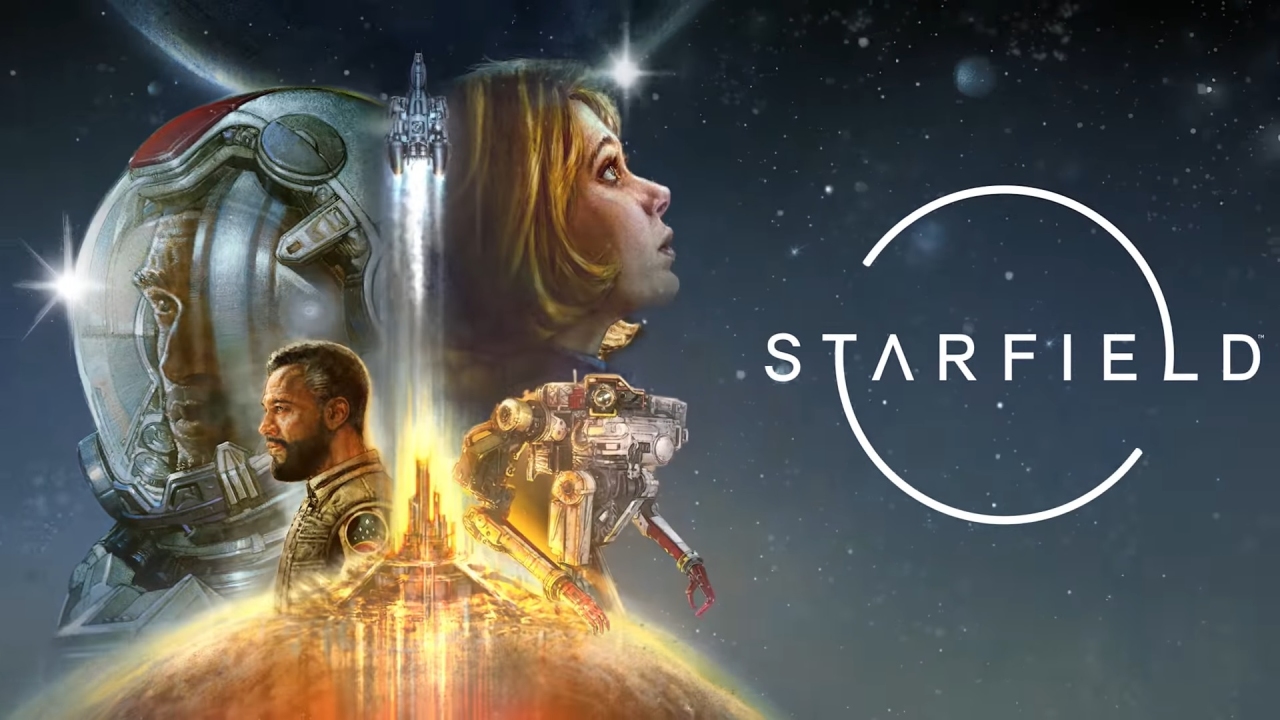
for decades now, Bethesda Games Studios' titles have held a pretty unique spot in the medium. i still remember trying Skyrim for the first time on New Year's Eve - probably having watched my parents play Oblivion when i was younger and being curious about what's up with these dang old-ass scrolls? - and taking some absurd hike through the mountains to get to Solitude against all better judgment. with hindsight, i kind of chalk it up to being a bit more naive and impressionable about what Real Gamers thought was cool, but it's hard to argue that for a hot minute there, Bethesda was THE studio leading western-style RPGs into a 21st century open-world renaissance. i have plenty of gripes with their general formula and approach to game design that you'll become intimately familiar with by reading this piece, but i think it's important to lay the groundwork that their prestigious reputation didn't come out of thin air. no other studio was (or still is) devoted to the types of things Bethesda really cares about doing, and when Skyrim took off and became a massive multi-demographic hit, it left its fingerprint on entire genres of video games for the following decade.
then, of course, there's Fallout, Bethesda's inherited second franchise, skewing for a much more distinct blend of post-apocalyptic Americana tinted by sci-fi pulp. The Elder Scrolls might be the first of Bethesda's franchises that i really properly fooled around in, but over time, Fallout is the one that's won my heart, with its kitshcy aesthetic and approach to how old habits, be they personal or societal, endure and mutate through armageddon.
and for a long time, that was it! Bethesda as a publishing entity has plenty of games they've overseen, but their in-house work has always bounced back-and-forth between these two titans of the genre, and one of them was acquired from another studio entirely, transformed from an isometric PC game into a more palatable, more Bethesda-y first-person affair. it's only now, almost thirty years after The Elder Scrolls: Arena, and in the midst of an unprecedented corporate acquistion by Microsoft, that we're finally ready to see a new world crafted by one of the most storied and prolific studios in RPG history. you've heard of Fantasy Game, you've heard of Apocalypse Game, but finally, Todd Howard has delivered us the third possible game from the periodic table of games - Space Game.
i had, honestly, relatively low expectations for Starfield. it was shrouded for secrecy in so long - seriously, i'm only barely joking when i say it really was pitched as just "Bethesda's doing a Space Game" - and when it finally came time to actually see it, the first impressions ended up feeling kind of low-impact, whether it was Todd Howard saying the quiet part loud and calling it "Skyrim in space" or Phil Spencer pre-emptively lowering the bar in an effort to make a broader point about how the Xbox division has found itself backed into a real tough corner. it wasn't entirely Bethesda's fault, though. what really sealed the deal for me were their friends/rivals/new neighbors over at Obsidian Entertainment.
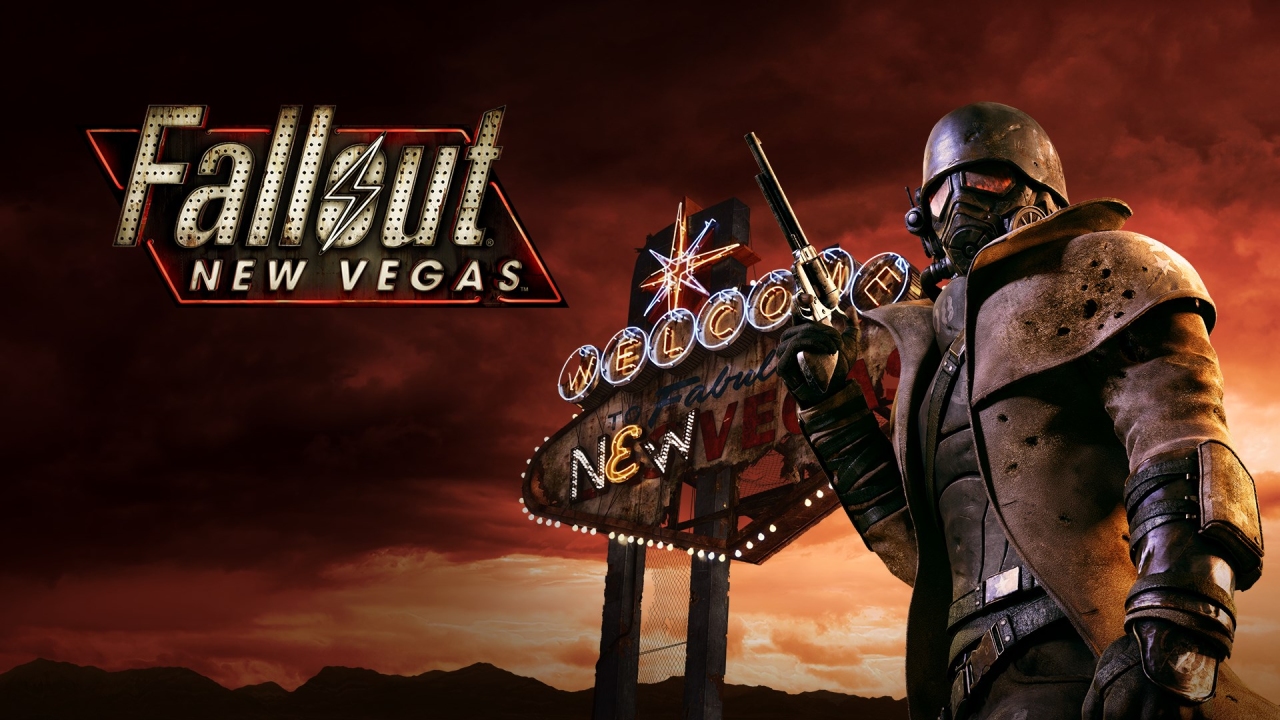
i don't really know how much of an introduction i need to provide for Fallout: New Vegas, because for the longest time, all i knew was it was the one people really liked, the one people made hours-long video essays about, the little RPG that could with a cult following dying to let you know how well it still held up. in case you're unfamiliar, New Vegas is a spinoff of the franchise, developed in the Fallout 3 engine to hold fans over while Bethesda focused on Skyrim. it was made by a studio full of people who had worked on the original top-down Fallout games, and sort of splits the difference on two very different styles, combining the gameplay skeleton of a late-2000s Bethesda game with the deeper character-building and west coast setting of the Interplay titles. upon release in 2010, New Vegas did alright for itself, but was famously a little rough around the edges, ultimately losing out on bonus pay for Obsidian over a handful of points on Metacritic and culturally seeming largely overshadowed by Skyrim the next year.
i had tried New Vegas's opening sequence on consoles a few times over the year, but always bounced off it a little bit. come January 2023, though, and i was longing for a game i could really sink my teeth into while i stayed cozy over the winter. finally armed with a certified Computer For Gamers, i decided to install it and give it a shot, and i went absolutely head-over-heels for it. it is, as i write this, one of my absolute favorite games i've ever played, and the only thing stopping me from writing about it on HYPERFIXT was a sense that i was late to the party, that people have spent years making compelling arguments for its status as perhaps the best RPG of all time and that i'm the silly one here for not listening sooner.
the real story here isn't the immaculately crafted narrative of ideological tensions coming to a head in the post-post-apocalyptic Mojave wasteland, though. no, the real story is a tragedy, because nobody else does it like Obsidian did, even Obsidian themselves. i've had fun fooling around in Skyrim here and there, sure, but i've never actually sat down and finished a playthrough of it, for reasons spanning from 'too big, got distracted' to 'i literally don't care about my mystical destiny'. when the pendulum swung the other way and Bethesda made Fallout 4, they took things back to the east coast and, along the way, happened to ditch basically every facet of meaningful role-playing and choice, instead going all in on a sort of psuedo-DayZ approach to crafting and building. Obsidian's own The Outer Worlds is a fairly good time and managed to beat Starfield to the punch in some respects, but it's also decidedly scaled down and hits a little different with its blunter, wackier approach to satire.
so, after years of waiting and presumably COVID-driven delays, when it finally came time to unveil what Starfield was going to be... it really did look like just another Bethesda game. one with interesting touches, sure, but falling into all the same trappings that have lost a lot of their shine since 2011. when Todd Howard boldly proclaimed that this game was going to have hundreds of star systems with thousands of planets, that wasn't exciting to me. it made me recoil, because i knew immediately that there was no way they made all of that breadth meaningful, and because the best Bethesda-style RPG is one that they didn't even make, where another studio came in and dialed the scale way, way back to focus on a tightly constructed, deeply connected, highly interactive world.
but, then again, here we are, and i played Starfield anyways, to some form of completion. the best defense i can muster up is that Bethesda's games are like potato chips to me. no, i wouldn't run out and recommend them to a friend as the height of what the medium has to offer, and i probably won't even finish the whole bag, but they're tasty enough and easy to eat a lot of. Microsoft being caught in a race to the bottom on pricing and availability certainly plays a part here too, since it meant the only major sacrifice on my end was one of digital storage space.
i guess right off the bat, an important thing to establish is that i didn't have a bad time playing Starfield. i have lots of gripes with it, big and small, but it generally wasn't a chore to keep playing it, and i spent plenty of time actively going out of my way to find more stuff to do in it, so clearly i didn't hate it outright. there's a lack of technical polish around the edges - the game loved to hitch up and freeze entirely if i tried to open my inventory too fast after landing on a new planet, for example - but the moment-to-moment gameplay feels good. this is really BGS's first time making such a gun-heavy game without the aid of Fallout's VATS system to fall back on, and they honestly pulled it off, because combat feels good, with a variety of interesting tools worth switching between and a pretty tight flow.
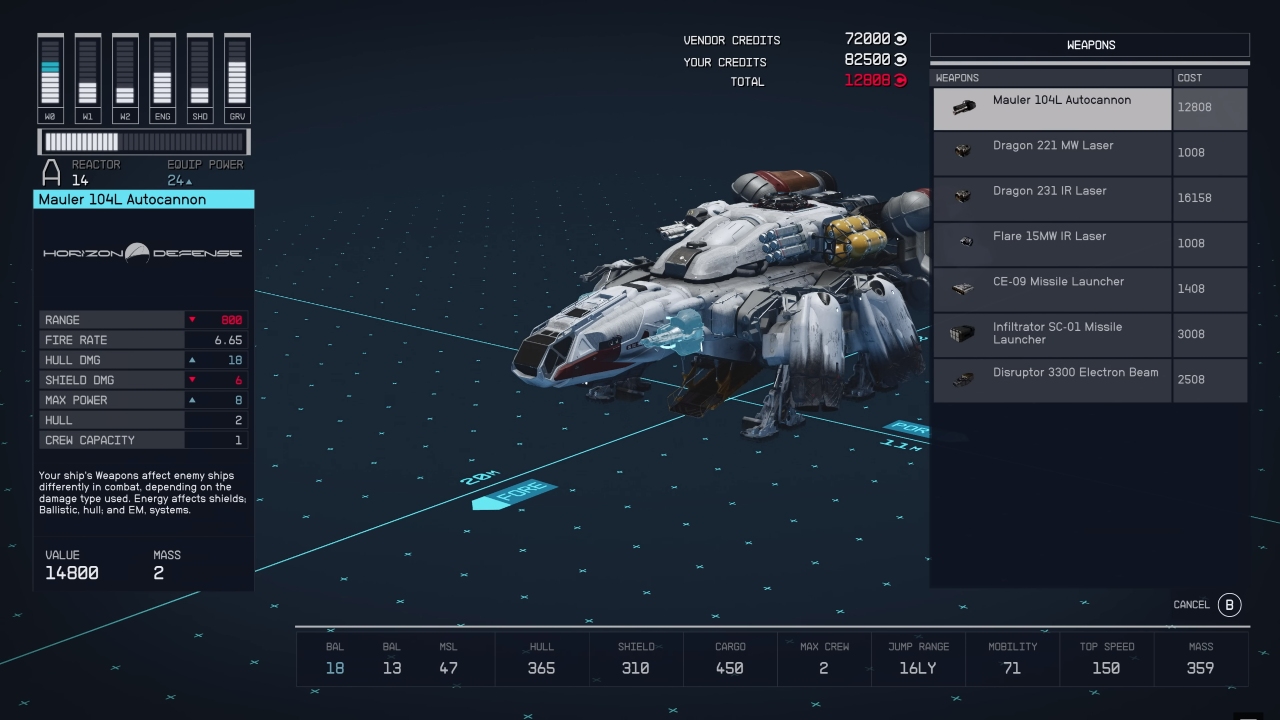
if there's one system i'd actually really praise whole-heartedly, it'd be the spaceships. pretty much everything else, good or bad, feels hodgepodged together from Bethesda's history, recontextualized and given maybe a few extra passes of polishing. the spaceships are the one thing i would say Starfield can unequivocally call its own, and you can tell the developers realized how much of that sci-fi power trip hinges on the spacecraft, because they handled it all really well. flight controls don't feel like i'm wrestling against them, the little D-pad power distribution system hits a good balance between being fiddly and fun, and while it took me a while to come to grips with the game's ship-building mechanics, i actually found it to be one of my favorite aspects once i got into the groove of it. the addition of being able to disable enemy ships and seamlessly board them is also really impressive and actually feels worth doing, whether it's to deal with your enemy on more even footing or to steal a new vessel for your collection.
other than that... it's Bethesda, through-and-through. sometimes, it really does feel like they spent the last eight years between Fallout 4 and Starfield in their own little bubble, ignoring a lot of what's happened to video games as a medium since then. a lot of the little touches that have always felt a little stilted and mechanical about Bethesda's titles are still here without much to paper them over. there's not really much in the scripted quest design of this game that feels like it wouldn't have been possible a decade ago, and the procedurally generated 'radiant quests' feel just as hollow as ever, if not moreso thanks to how this game handles procedurally generating entire planets.
it should be immediately obvious to anyone who knows the first thing about video games that of course Bethesda didn't handcraft 1000 planets with unique content. you're only going to get that kind of scope if you start working algorithmically, creating distinct pieces that can be slotted together into a decent enough solution by a computer. the issue, to me, is how much of that scope is really worth it. in a game like Skyrim or Fallout, it's not that hard to smudge the line between overt design and procedural generation - drop a rusty shack in the middle of the woods, or place a bandit encampment in a cave, and just let players stumble into it naturally as something to do if they're out wandering. 'wandering', in Starfield, is fundamentally different, though. you're not walking out into the wilderness, you're making jumps between distant stars and scanning planets for their resources and outposts. Starfield is set in a world where space travel has become stagnant, boring, and taken for granted, and the harsh drop-off in quality between handcrafted settlements like Neon and procedurally generated backwater planets honestly reinforces that feeling within me as a player, because exploration doesn't end up feeling especially rewarding.
one of the many side quests i encountered in my travels was a visit to a facility called the Eleos Retreat, meant to be some kind of isolated rehabilative colony for convicts. it's still under construction, though, and one of its workers has gone missing. it's a long back-and-forth of finding a missing person and negotiating with bounty hunters who see the Retreat as easy pickings thanks to how many wanted targets are living there, but the point of me bringing this up is the abandoned outpost the bounty hunters have holed up in. that abandoned outpost isn't unique - when i arrived on Ixyll II and started following this quest, i immediately recognized it, because i had run into the exact same building layout only an hour or two ago as part of a procedurally generated quest that i did for some quick cash since it was already on a planet i needed to visit anyways.
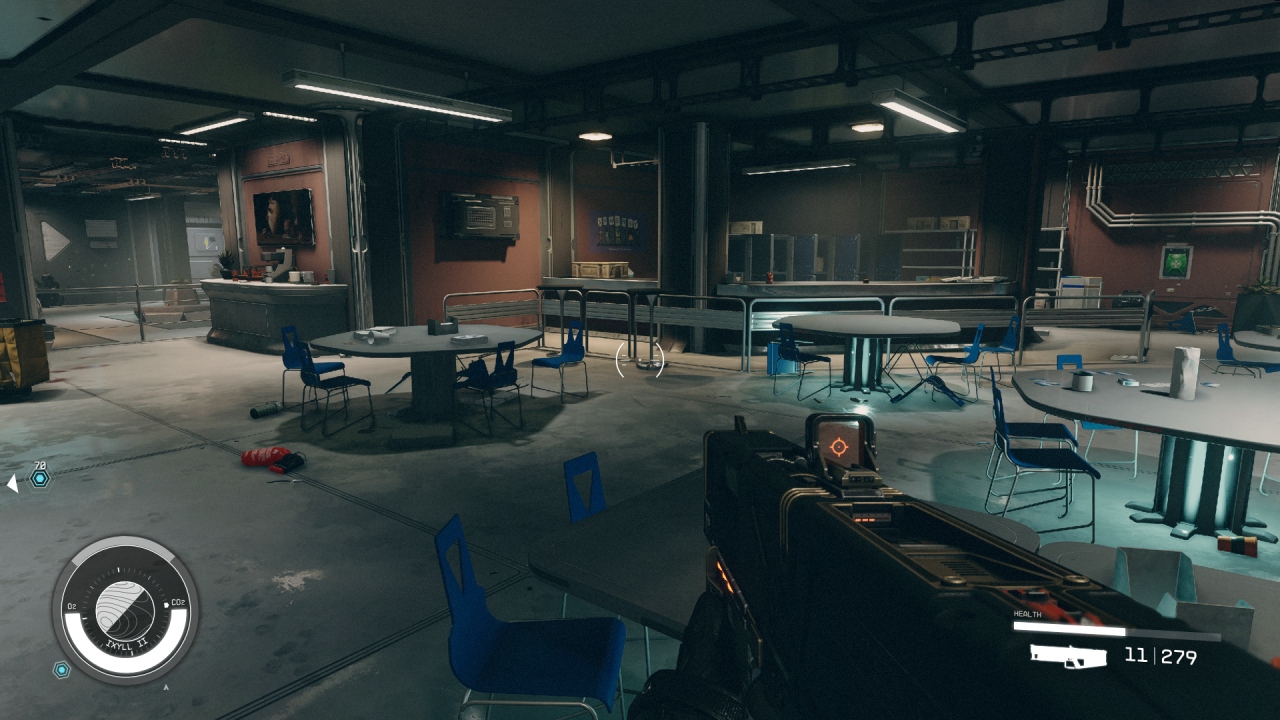
every room, every bunk, every crate of ammo, every safe tucked away under a desk, it was all familiar. the stuff inside the boxes might be different, sure, but i'd seen everything this building had to offer already, even though i generally avoid going out looking for meaningless busy work over and over. if i visited every meaningless proc-gen moon, i'd expect to start running into this type of repetition sooner or later, but this was me following up on a side quest with named characters, unique dialogue, and an interesting narrative hook that i thought was worth pursuing. when you can go out of your way to try and discern what planets actually have something unique in such a vast galaxy and still run into repeated content, it creates a sense of doubt in me as a player. it makes me a little less likely to go out of my way for things, a little pickier about where i land, a little more likely to just grav-jump straight to the game's handful of big cities and skip over everything that's not on my immediate path.
to start using it as a counter-point for what i find flawed in Starfield, let's look to Fallout: New Vegas again. that game has, relatively speaking, a small map - still pretty big, all things considered, but much more tightly packed compared to contemporary Bethesda releases. there might be less of an incentive to just point yourself in a direction and start walking, but the benefit is that there's basically no wasted space anywhere in the Mojave. everything is placed with intentionality and artistry. the Deathclaw-infested Quarry Junction is used as a chokepoint to encourage players to take the long way to the Vegas Strip, which means you're stumbling through places like Primm and Novac where you're meeting interesting people, picking up exciting quests, and taking more time to learn about the world and shape your opinions as a denizen of it. you'll probably run into the NCR and Legion at some of their smaller outposts throughout the southern edge of the desert, which means you'll have hands-on experience before you can reach their bases of operation and start making big decisions about what sides you're taking in their ideological and military conflicts.
in-house Bethesda games, on the other hand, are obsessed with scale, particularly scale that can be quantified in some exciting way like "1000 planets". they are the original progenitors of the "See that mountain? You can climb it." school of game design. it doesn't matter if the mountain is worth climbing - it matters that it's there and that you could decide to do it, and that there's a loose framework of combat and looting to make you feel like you got something done on the mountain. even some of the larger mechanical additions they've made to more recent games, like outpost building, have a similar weightless feel, where the act of being able to do a thing is considered novel enough reason to do it. cards on the table - i didn't build a single outpost in my entire playthrough of Starfield. it is, thankfully, pushed a lot less hard than in Fallout 4, where the system already sucked to begin with, but now it just seems kind of vestigal, and most of the major benefits you get out of it seem to just feed back into making more outposts.
all of this still isn't really surprising, though, is it? like, of course they did it this way. i might prefer a tightly crafted world of, say, a handful of star systems that each have uniquely crafted worlds that only use light touches of procedural generation to fill out the wilderness, but i'm not shocked that Bethesda went big. going big is kind of their entire brand and expecting them to meaningfully dial it back at this point is a bit of a fool's errand. if all i had to say about Starfield was a debate between the merit of small hand-crafted worlds vs. algorithmically driven grandeur, i don't think i'd be here writing about the game.
what's really made me want to talk about Starfield is the writing. if there was anything particularly exciting about yet another Bethesda game beyond the window dressing of a new genre, it was the fact that they haven't created a new universe since before i was even born. Bethesda's writing is... let's say hit-or-miss, but generally in a way where i get really invested about how they failed or succeeded. the biggest example of this would be their last game before Starfield, Fallout 4. when that game first came out, i didn't really mind the story too much because i didn't have much outside context to compare it to, but having now played New Vegas, i actually have some extremely strong opinions about how much Fallout 4 fundamentally misunderstands the core appeal and potential of that franchise.
as cheesy as it feels to say this, Fallout at its best is a story about society. in the wake of petty squables leading to nuclear armageddon, civilization rises from the ashes, and i think the fundamental driving factor that i see in that setting is how it explores human nature. the citizens of the United States, before the bombs dropped, lived in a simple retro-futuristic world of good guys vs. bad guys, spurred on by propaganda and rampant consumerism. as civilization finds its footing again, the Earth is inherited by all sorts of people, whether they've lived their entire lives on the ruined surface or been unwitting guinea pigs within the Vaults. Fallout interrogates about how people should guide the future of society in the wake of global annihilation - how much should these new civilizations emulate the ones responsible for the apocalypse? how do traditions change when handed down from the old world to the new? war might never change, but how do the people who fight it?
Fallout: New Vegas carries these themes on masterfully. when i described the game as 'post-post-apocalyptic' earlier, that wasn't a typo - it's set 200 years after the bombs dropped and it actually feels like it. the slate was wiped clean, but it's had time to become populated with all sorts of burgeoning new civilizations, and the game's main factions all represent facts of how the old world impacts the new. the NCR seeks the glory of the old United States and commits to some classic imperialist overextending and annexing to feed that fantasy. Mr. House is literally an old world capitalist dedicated to self-preservation, cloaking his autocratic ambition in the same kind of futuristic promise that fueled Vault-Tec. the Legion give off the outward impression of just being flat-out terrible, and they are, but Caeser has a surprising amount of keen foresight into history and sociology and pragmatically uses ancient Roman iconography as a model to motivate and enforce his violent reign.
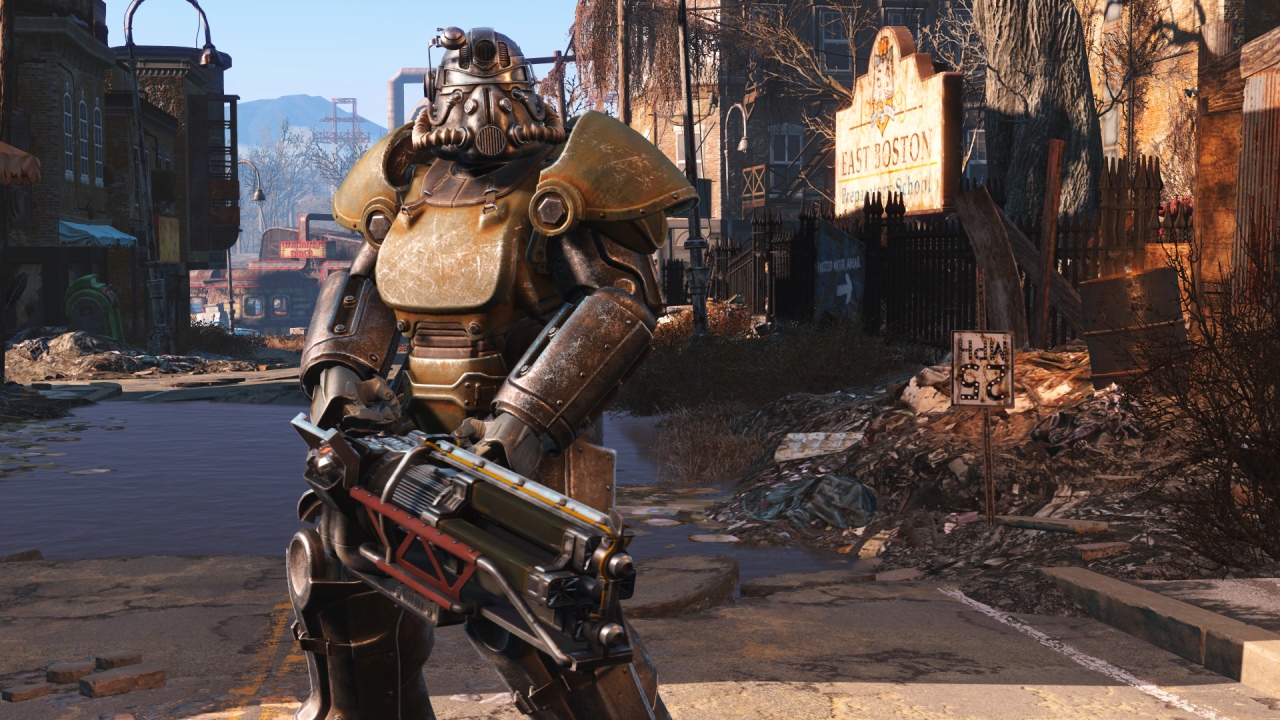
Fallout 4 is about... i dunno, how cool the apocalypse is? it's basically an isekai, except for the parts where it isn't. on the one hand, you're more detached from the world around you than ever - your player character was frozen as the bombs fell, so you have to learn the ropes of what's up in post-apocalyptic Boston from square one. one of the biggest instances of this ludonarrative dissonance comes from the currency in the game. i, the player, know that bottle caps are the de facto currency of Fallout, but in-universe, why would someone fresh out of cryogenic sleep know to start hoarding those things like crazy? you could say that if i care about roleplay, i could choose not to engage until i feel like my character would understand that, but i would say that games like New Vegas demonstrate that you can start the character out as an existing citizen of the setting who'd understand these things and still make the player feel the drive to learn more about the world at the same time. you can absolutely create compelling opportunites for roleplay in your role-playing game without asking that the player simply disengages from entire systems to feel immersed.
then, on the other hand, there's Bethesda's ever-present urge to make sure the player feels important. in Skyrim, you were the descendant to an ancient lineage of dragons. Starfield, in its own way, has a similar hook that i'll go over later, where you're immediately thrust into becoming a Very Significant Person. Fallout 4's hook is that you had a spouse and child before the apocalypse, and that someone has mysteriously stolen your baby boy from his pod. this winds up being a real mixed bag for the storytelling. it's refreshing that you're not given some kind of fundamental power that makes you better than other people, yes, but it also makes getting in your character's shoes incredibly hard. want to go out and explore the Commonwealth like Bethesda clearly urges you to? alright, but don't forget you're also a parent who's ignoring the single-minded search for their child! have fun!
the game does very little to meaningfully play with the themes that drive Fallout. there's sort of a throughline of how you can't live your life stuck in the past, i guess, but the broader sociopolitical implications of armageddon are pared way down and the game mostly uses Boston as set dressing, making some skin-deep connections to how the good guys rebuilding society are kind of like the Founding Fathers or whatever. it devolves into a bunch of stuff about androids replacing people and your son being the twist villain or whatever, but none of this feels like it's really got a point.
sometimes, i see people say Fallout should move outside of America for its next game, and i vehemently disagree, because i think the specific framing of post-WW2 American paranoia informs so much of what makes Fallout, from the big picture stuff like world design right down to the smallest details. if you've only happened to play the in-house Bethesda games, though, i can see how you would come to the conclusion that the real-world settings are just novelty flavors of the month draped over a generic post-apocalyptic frame.
another reminder, then, that Fallout: New Vegas handled all of this a million times better, and managed to make the player feel important without making them some kind of supernatural being or giving them a hard-coded emotional throughline. you're just a courier who was in the wrong place at the right time. the game proposes a driving question - 'why'd that guy shoot me in the head?' - but how you feel about that is up to you, and your significance in the Mojave conflict is much more of a slow burn as you come to understand the true importance of the delivery you were making. by the end of a playthrough, you'll have shaped the future of New Vegas, but not because you became the living embodiment of your faction of choice. you're still just a courier, with a very literal bargaining chip that everyone wants, and all the opportunity in the world to decide who should get it.
...wait, crap, i started this whole thing because i wanted to talk about Starfield, didn't i? let's back up a little bit.
Bethesda's lackluster handling of what makes Fallout such an interesting world might be in part because it's not a world they crafted themselves. they inherited it from Interplay, and New Vegas was put together by people closer to that original process, who had a tighter grip on why someone felt compelled to create that world in the first place. what kind of bold new vision have the minds at Bethesda Game Studios fashioned when given a new blank canvas? it certainly skews closer to something like Fallout than the outright high fantasy of The Elder Scrolls, which is great, because it means i don't feel compelled to go play Skyrim to start drawing specific points of comparison, although i'm sure it'll come up in broad strokes.
if i had to try and describe what Starfield is about, in a broad tonal sense without digging into the actual meat and potatoes of the plot, i would say it's a game about human curiosity and the innate, intangible drive towards understanding our universe. it poses questions about the risk and reward of seeking out new knowledge, of what drives people to explore, and what a world where humanity has outgrown a dead and decaying Earth might look like. a term coined by the development team for the game's aesthetic that also serves as a useful compass for parsing its message is 'NASA-punk' - the game does start dipping into questions of extraterrestrial life and leans more and more into the 'fiction' side of sci-fi as it progresses, but it's starting from a baseline of practical, utility-driven space travel in a world where humanity hasn't found signs of anything else sentient out there in the cosmos.
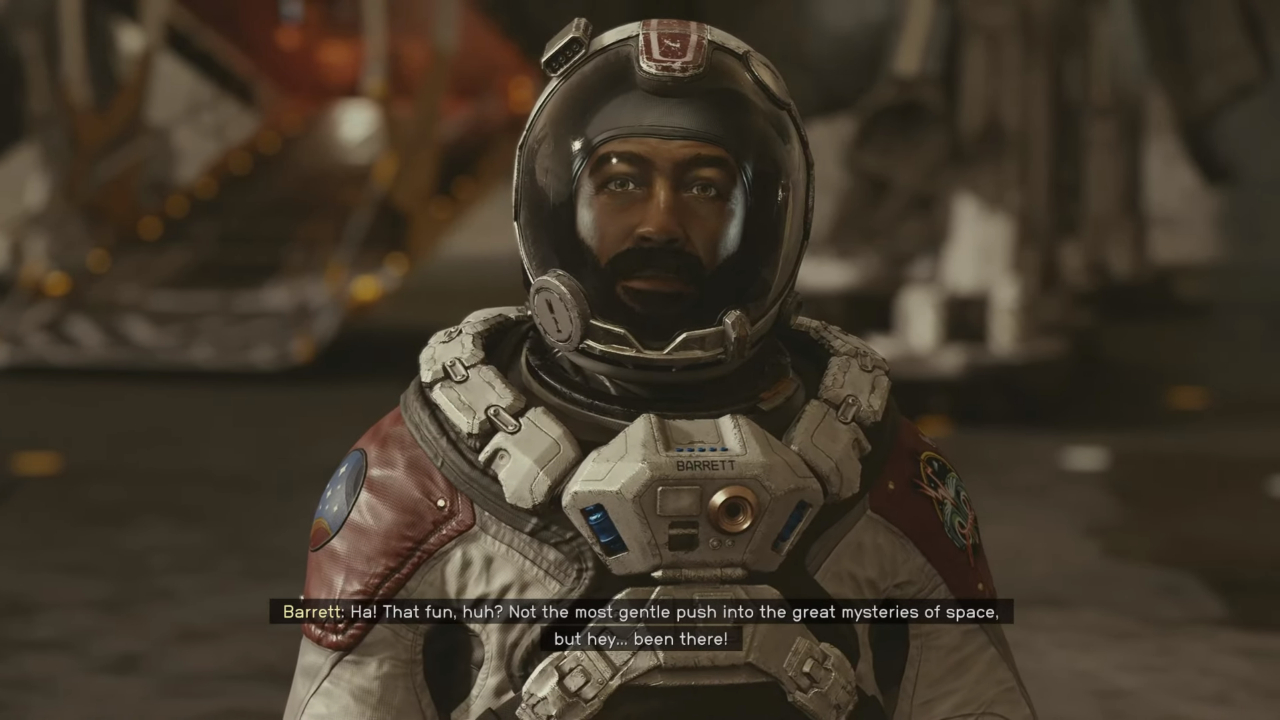
outside of being a guiding principle for the game's aesthetics, though, i think the 'NASA-punk' thing really speaks to what they were trying to do with this game's story. this is, absolutely, without a doubt, a game written by the type of guy who laments that America stopped sending guys to the moon. the plot of the game opens with you working a mining job for a mysterious client and uncovering a strange Artifact (proper noun) that shows you grand visions of space and music. this client, as it turns out, is a member of an organization called Constellation. they're the 'last true explorers' in a world where space travel has become normal, boring, and routine, living in a sort of X-Men-esque mansion and solving cosmic mysteries that the local governments have neglected. your experience with the Artifact is enough for the client, Barrett, to immediately entrust you with his starship and robot so that you can head to the United Colonies capitol city of New Atlantis and become a member of Constellation yourself.
the entire opening is rather hectically paced, almost certainly with the intention of getting the player to The Good Stuff as fast as possible, and i look forward to its long introductory elevator ride becoming as infamous as the Skyrim wagon one day. aside from however long it takes you to create your character (very, in my case), the whole sequence takes maybe 15 minutes tops and immediately primes you as Very Significant for having your cosmic experience, enough so for a complete stranger to hand you the keys to his only way off the planet. with how the game then funnels you into a fairly expansive tutorial on the lunar surface of Kreet, it's easy to lose sight of all that big picture stuff for a while.
while we're talking about the introduction to the game, i will absolutely give Bethesda props for walking back some of their decisions from Fallout 4. yes, you are invariably a miner at the start of the game, and you will invariably experience some kind of awe-inspiring celestial awakening, but the character creator does have a fairly robust set of backgrounds and traits for you to choose from. these mostly end up affecting statistical stuff and what skills you'll start off with, but it's closer to roleplaying than anything in Fallout 4, and the stuff you choose does occasionally come up as an option in dialogue. i chose the Diplomat background, since it had useful skills in speech and commerce, but i also took on the Wanted trait, meaning my character had accrued a mysterious bounty before i took control. they were also an introvert and happened to inherit a dream home on the planet of Nesoi. in the time-honored tradition of filling in the ludonarrative gaps, i imagine Captain Tallahassee was a diplomat of sorts, but perhaps more of a blue collar mediator aboard a cargo freighter than an upper-crust government official, settling the tensions of interstellar travel with a silver tongue rather than an electron cannon. one thing that helps with that level of player-driven background detail is that Bethesda has also ditched the 'voiced protagonist' angle from Fallout 4, making it much easier for writers to create more dialogue options and for players to insert their own tone and motivation into their choice of words.
after a few hours of learning the ropes of gameplay on Kreet and putting my persuasive skills to work on the local pirates to avoid a full-blown gunfight, it was finally time to head for New Atlantis and get properly acquainted with the main cast of the game. Constellation is an eclectic mix of personalities, such as the socially awkward theologian of the group, Matteo, who provides a uniquely spiritual insight into what is largely a practical science-driven organization, or Walter Stroud, a CEO who would rather put his bank account to work funding something interesting than just sitting on his fortune until he dies. the one who ultimately takes point on inducting you into Constellation and becomes your first of four potential companions, though, is Sarah, a former UC military navigator who turned to Constellation when her space exploration division was shut down and eventually rose to leadership of the guild.
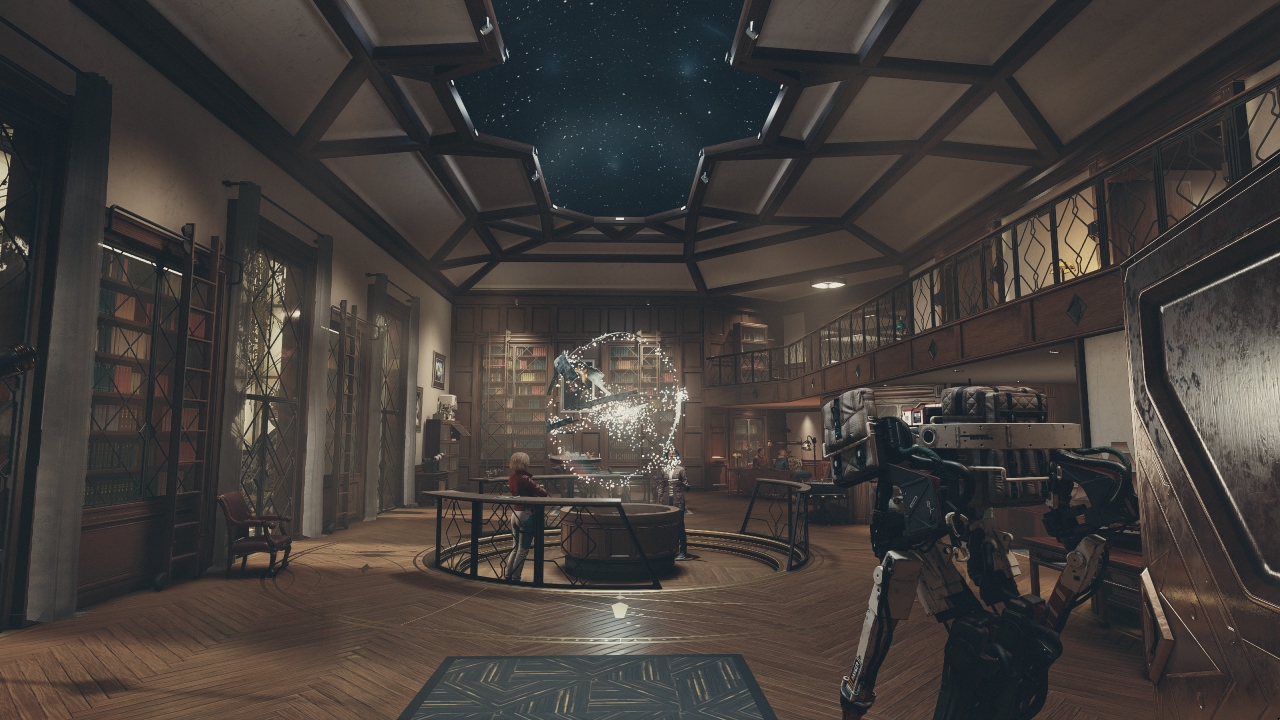
when you're first introduced to Sarah, you have a myriad of traditional Bethesda-style "woah, you're telling me, Normal Space Person, that i'm now Important Space Person?" dialogue options to pursue, but one way or another, you're ending up in Constellation. each of the four companions has a mandatory quest where you'll tag along with them and follow leads towards more Artifacts, and Sarah's quest is the first of these, taking you into our own solar system to do a little detective work on Mars. when you talk with her about this mission, she brings the conversation to a pretty abrupt halt to deliver this chunk of dialogue, which i'll just go ahead and quote in full -
PLAYER CHARACTER, OPTION 3: What do you mean? You don't care if I steal as long as I don't get caught?
SARAH: I mean Constellation has a roster of members who haven't always been on the "right" side of their respective society. We're risk-takers. Some of us have seen the inside of a jail cell, more than once. If you join us, it means you're committed to our mission. In exchange, we give you latitude in your choice of means.
- and this exchange... breaks the game in half, a little bit? cuts right to the core of a lot of issues all at once? we're going to spend a lot of time unpacking what this one means and how the entire rest of the game doesn't really live up to the tone being set here, but for now, i'll just start with the immediate impression i got and not the long-term implications. my gut reaction to this was that this conversation snapped me out of any sense of immersion i felt inside Constellation's ranks. this was not Sarah being frank with me about the nature of Constellation as a diverse organization, with a common cause that transcends being worried about doing things strictly by the book. this was Todd Howard himself (or, if we want to be accurate and not silly, long-time Bethesda head writer Emil Pagliarulo) reaching through the screen and grabbing me by the shoulders to say "LOOK, CONSTELLATION IS THE MAIN QUEST, YOU CAN DO WHATEVER YOU WANT AND THE GAME'S NOT DESIGNED FOR THEM TO KICK YOU OUT, YOU'RE GOOD TO NOT GIVE A SHIT". even if it weren't for the fact that Sarah ends up being the most outright 'lawful good' companion in a group full of people who get antsy about you doing any crime, this moment would still boil down to Starfield dropping any artifice of its storytelling, just to reassure people who are only here to game that the underlying systems fundamentally can't punish you too hard or lock you out of anything based on the choices you make.
not exactly helping matters when it comes to trying to immerse yourself is how impenetrable the lore of Starfield can be for a beginner. the game signals some of its broadest strokes early on - some of the traits you can choose in the character creation process are background information like where your character grew up or their religious beliefs, but i avoided all of those because, well, i'd never played Starfield, had i? how am i supposed to know if i prefer the United Colonies or the Freestar Collective without any prior context? when it comes to starting a player off in a story, especially when it's been so long like it has been for Bethesda, i think it's important to give your audience some shorthand for what the big factions' respective deals are. case in point, Fallout: New Vegas - the game's world design subtly guides you through an NCR outpost suffering from resources being spread too thin, a town that's been overrun and burned to the ground by the Legion, and the outskirts of Vegas where you can literally see Mr. House's wealth and protection cut off in the form of a wall around the inner Strip. no matter what you do or how long you stick around to ask questions, you're going to form an impression of these major players in the Mojave.
Starfield understands that this type of environmental storytelling is good and useful for onboarding new players, but it stumbles in one critical area. as an example here, your first mission with Sarah starts by asking the local UC Vanguard recruiter about a troop who's run into some trouble and also happens to be in possession of an Artifact. the recruiter, Commander Tuala, immediately tries to sell you on the idea of joining the Vanguard, giving us our first hints that United Colonies citizenship is granted based on volunteer service with a particular bias towards military service. that, to me, sounds abjectly horrifying, and i'm not a fucking cop, so i'm never going to do any of that. the thing is, though, that according to impressions i've seen from other players, the UC Vanguard questline is actually one of the best ways to get a crash course in the lore of Starfield, learning about the recent war between the UC and the Freestar Collective, with details like why and how that war was fought.
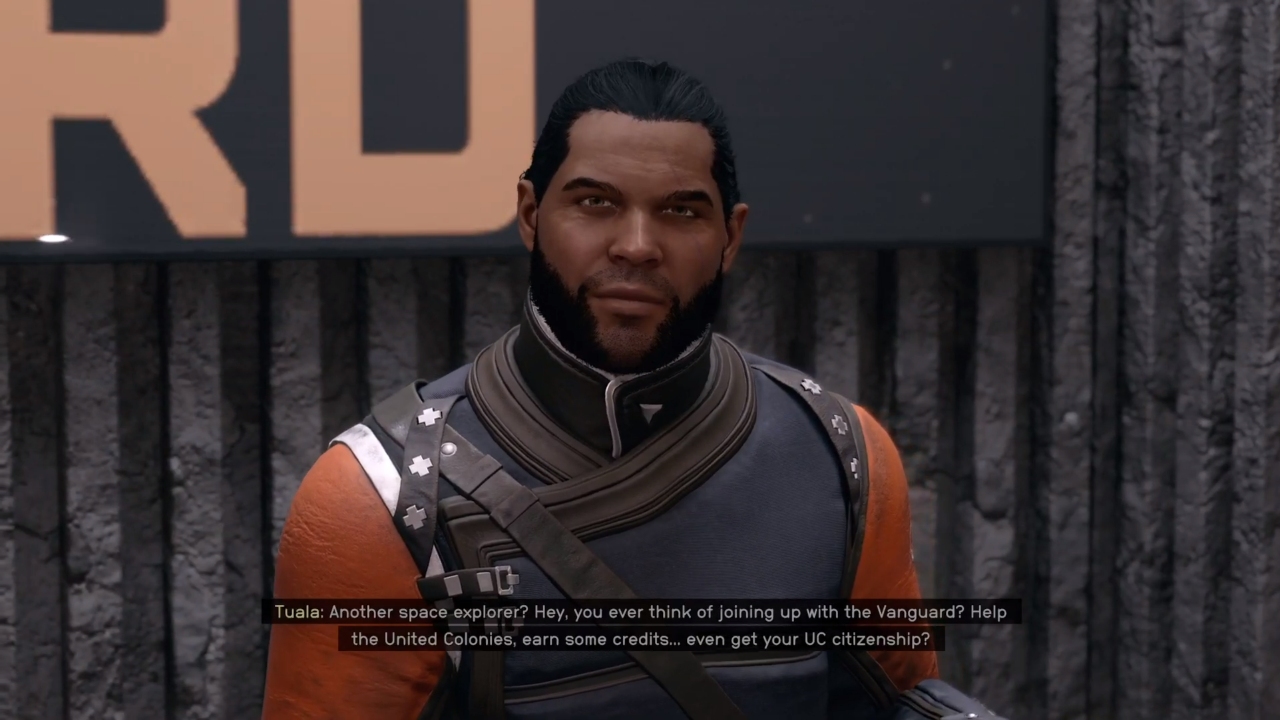
the worldbuilding of Starfield's biggest flaw is that it assumes you'll be interested in doing certain things and gates information behind them. if you don't want to be a cop in this role-playing game, you're just going to have less access to the history of this world and you're going to be spending a lot more time piecing things together based on passing mentions. the Colony Wars, in-universe, only ended about 20 years ago, and yet i kind of have to play my character as if they've never heard of this major historical event, because i've never heard of it and the opportunities to learn about it are put behind choices that neither me or my virtual avatar would have any interest in taking. Starfield is designed to guide you to places where you might learn a thing or two, but it feels like everybody in the writing and design process just assumes players aren't going to have any firm ideological beliefs and hang-ups about major institutions.
to me, it seems like Bethesda doesn't want to fathom the type of player who doesn't want to be a cop, because they're approaching this from the lens of someone playing a video game and assuming players just love picking up as many quests as possible. in a vacuum, that wouldn't be a dealbreaker. i still play Halo and care about its characters, even though i know that if the UNSC and Spartans were real, i'd be protesting against them. the difference, though, is that Halo is a linear story, written and told just one way without player input. Bethesda prides themselves on their vast, immersive worlds that players can truly live in, but when they finally develop a fresh exciting new IP for the first time in thirty years, it feels like it's hard to start finding your footing and immersing yourself in that universe unless you either don't detest the Vanguard or are willing to check your baggage at the door, immersion be damned.
what really exacerbates this issue is that, of the four major faction questlines in Starfield, at least three of them are this unapproachable for my tastes, if not all four. we've been over why i don't want to join the UC Vanguard, the Freestar Collective questline seems like largely the same thing with a bit more of a libertarian cowboy angle, and i find it hard to justify climbing the corporate ladder with Ryujin Industries whether that's in-universe or just my own personal opinion. for someone like yours truly who's not especially fond of police or mega-corporations, that leaves only the Crimson Fleet, and... well, we'll cross that bridge when we get to it. you could say the point of roleplay is to be something i'm not, or just accuse me of overthinking these options, but, again, New Vegas comes into play here, because that's a game that actually feels like it accomodates a wider variety of viewpoints. not only are there more factions in that game who represent the common citizens of the Mojave, but it was also easier for me to think pragmatically, to pick and choose when i helped the NCR push back the Legion and when i undermined their efforts to annex the region.
enough about faction quests i'm missing out on, for now, though. the first act of Starfield's main story keeps chugging along, giving you lots of reasons to visit various regions of space and plenty of one-on-one time with your new Constellation companions. for what it's worth, i don't dislike most of the crewmates this game gives you, for the most part. Barrett doesn't leave a strong first impression when you're being rushed through the introduction as fast as possible, but once you start working with him in Constellation, i think he works well as almost an aspirational figure, the type of explorer i wanted my character to develop into. he's the type of guy who'll get kidnapped by pirates and then make friends with them by telling old stories about the furthest reaches of space and the nature of quantum physics. he's been everywhere and dabbled in a bit of everything, he's charming and easy-going, but there's still some depth there too, as you help him process the death of his husband and start looking into some mysterious loose threads that death left behind.
Sarah, who we already covered a little, is easily my least favorite of the four major companions, with her ex-military background definitely shining through a little more often than i would like. again, it's bizarre to me that she's the one who delivers the speech on Constellation running by their own rules, because she's the quickest to chide you for going off the straight and narrow path. the other two companions who you don't meet as immediately are retired cowboy/divorced single dad/heir to an old-school pioneer fortune Sam Coe, and the mysterious Andreja, who's introduced in the midst of assassinating a local space cultist and takes the longest time to truly open up to the player. i don't know if any of these characters will really stick in my head in the same way companions like Veronica and Cass from New Vegas have, but they're all interesting enough for me to bother interacting with. i even managed to finish Sam's personal arc and help him have an honest emotional dialogue with his ex-wife, namely because i was so sure that he was gonna be the one with the dead spouse and i was pleasantly surprised when you find out he really is just divorced and he gets super real with you about it.
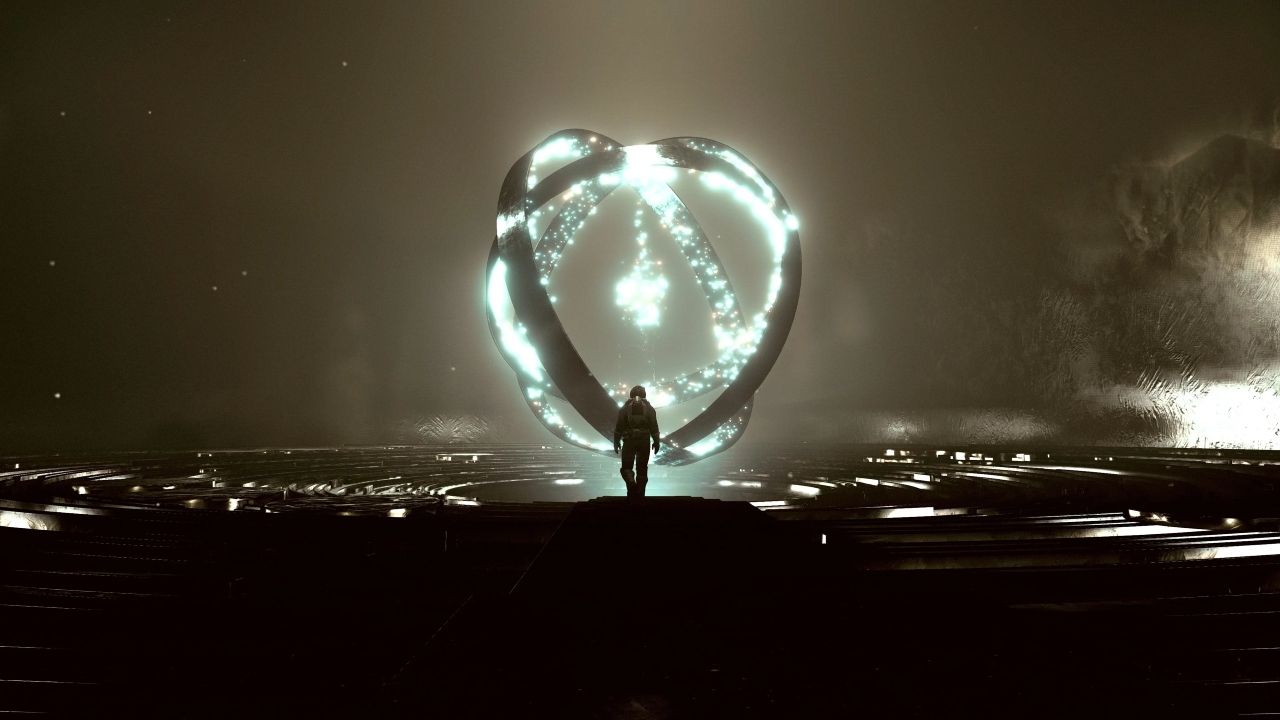
once you've had time to get acquainted with your new co-workers and seen more of what the galaxy has to offer, the next step of the mystery opens up, as it becomes clear the Artifacts are connected to a separate set of gravitational anomalies across the cosmos, leading you to ancient temples that clearly weren't constructed by any known human civilization. some of these temples are at set locations with curated setpieces to accompany them, but a lot of them are also randomly seeded throughout the galaxy on each playthrough, and since this is the most relevant time to get it off my chest - i honestly cannot believe Bethesda put these damn things in the game 24 times. there is only one temple puzzle, for all 24 temples, and it's literally to fly through hoops in zero-gravity environments. it never gets any different, the hit detection on the hoops is so imprecise, and sometimes the puzzle fakes you out by making you think the hoop is spawning one place and then shifting it once you start moving towards it. i wouldn't feel the need to put such a fine point on it, but again, they put this same thing in the game 24 separate times, and for a game that's supposed to be about the sheer majesty of space and the unknown, you'd think the main plotline should involve a more compelling puzzle than flying through hoops, an activity which we all still compare to Superman 64 to this very day.
anyways, get good enough at flying through hoops and you're granted space magic! indeed, these temples and the abilities they grant are basically just this game's equivalent of Skyrim's various Dragon Shouts. i'm not crazy opposed to this aspect of Starfield, but my first impression of the entire Artifact plot was that it was a pretty boring by-the-numbers ancient aliens thing, and the rewards feel so much like Elder Scrolls-style magic that mechanically, it felt grafted on from a different game. the abilites are neat enough - i particularly enjoy creating a low gravity field that makes my enemies hover helplessly into the air - but they're not meaningful enough to really shake things up and they end up feeling a little auxillary to the whole Starfield package.
since we're at a bit of a natural act break in the main story, now feels like a good time to start talking more about the game's side quests. i don't feel like i can really grade them as a whole, but if i had to try, i would say they did... fine? the game does a decent job of signposting things by having you naturally accumulate 'activities' just from overhearing NPCs talking while you're doing other stuff, so even if this game's stuffed to the brim with procedurally generated content, it's not too hard to go find the stuff that actual human quest designers made on purpose. as i brought up early on with the Eleos Retreat example, it can be hard once you're knee-deep in a quest to know how intentional its design aspects are, but there's a decent amount of places that at least start with a unique prompt and give you something to do.
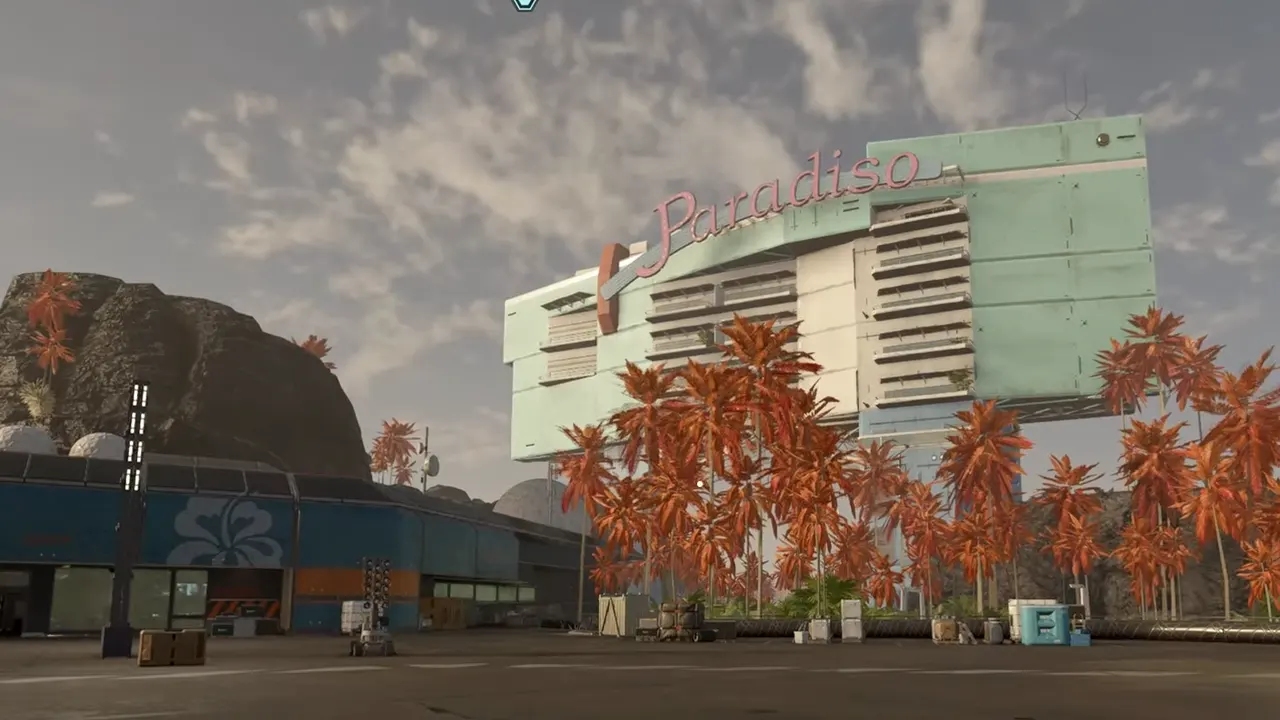
one of the first big side quests i wound up pursuing, and one that i think left a bit of an unfortunate impression on me, was heading to Paradiso and dealing with the ECS Constant. Paradiso exists out on the fringes of civiliziation as a kitschy resort planet, decked out with palm trees and the kind of kitschy iconography that wouldn't look out of place in Fallout. it also happens to be one of the few major settlements that isn't associated with the United Colonies or Freestar Collective, instead hiring a private security firm to enforce the will of the board of directors thanks to some old treaties they're still taking advantage of. when you arrive, there's a massive unidentified ship in orbit, which only broadcasts static when you try to communicate and doesn't match any known make or model. the security team on the surface, in classic Bethesda fashion, drop the problem in the lap of the first person who walks in, and ask that you try not to make a big deal about it so that the resort guests don't get scared off.
the true nature of the ship, and the reason it's unidentifiable, is that it's a 'generation ship', launched from Earth before the invention of the grav drive allowed for quick interstellar travel. the ECS Constant has only just now caught up with modern society and arrived at the planet of Porrima II, which they believe they have a right to colonize, as was their forefathers' mission. they ask you to be their representative in negotiations with the Paradiso board of directors, and you're sent back down to the surface in the hopes of cutting them a deal, with Captain Brackenridge emphasizing she isn't really looking to back down about claiming sole ownership of the planet, even if there's room to share.
so, i head back down to Paradiso and i'm sent up to the top-level suites to negotiate. i already have full clearance to do this, but there's a unique NPC at the reception desk - name, personality, voice acting provided by Casey Mongillo from that Netflix dub of Evangelion - who stops me to make sure i'm on the level. it's a bit of flavor to prep for the meeting, i guess, but when you put someone unique like Keavy in front of me, and have them tell me about their struggles of working as an underling to the board, gears start turning in my head.
i head into the boardroom and the directors are like, cartoonishly evil about all of this. there's the one guy in the room who says maybe it's bad to propose making the crew of the Constant work at the resort as indentured servants, but the other two are fully committed to maximizing profit and the CEO even muses about how he wishes the Constant just didn't exist and how oh-so-terrible it'd be if their ship just happened to blow up in a tragic 'accident'.
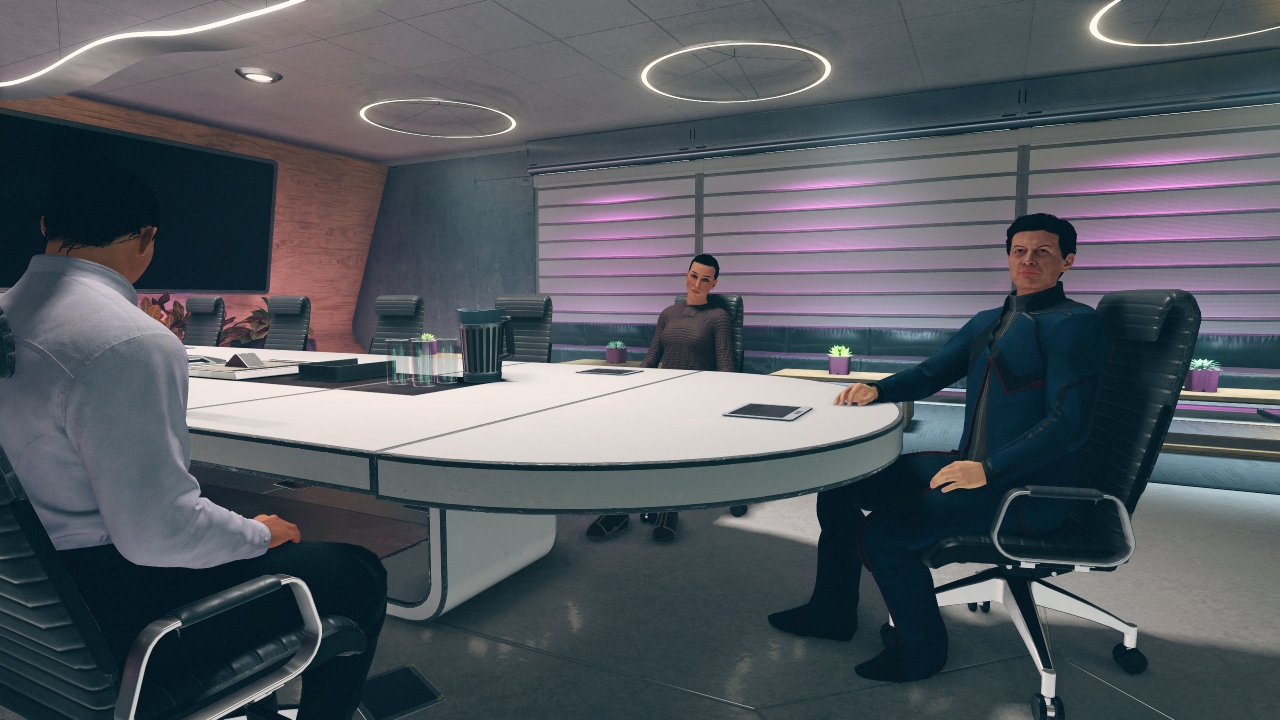
so i'm alone, in a locked room with a group of ghoulish caricatures of capitalists looking to enslave or kill innocent people, with the only remotely good offer being that i pay the five-figure fee to install a grav drive onto the Constant. i'm alone in this room with these people. and the receptionist out front doesn't seem awfully happy with their job. so, y'know, i start blasting. why does a video game have a disgruntled employee out front if not for me to have an alibi when i attack their bosses? man, wouldn't it be a funny and interesting conclusion to this side quest if you had this tropical resort for yuppies being occupied by a bunch of people who've only lived inside one old ship for their entire lives?
ah, wait a minute. the CEO just kind of stumbles over for a minute and then gets back up. i have a bounty applied to me, but the game seems to have trouble actually getting guards sent up the elevator to the executive suites, so everyone's kind of scared, but they just reset and start talking to me like nothing happened if i stop shooting for half a minute.
enter the 'essential NPC'. Bethesda likes to deploy this concept a lot in various ways, and it seems to only get more constrictive with each new game they put out. Morrowind had its famous 'thread of prophecy' that allowed you to kill NPCs, but gave you a sort of in-universe warning that this save would be softlocked and unable to progress in the plot if you happened to kill someone who was necessary to the story. twenty-ish years later in Starfield, this manifests as certain people just... not dying. attack as much as you want, they're just a little winded, they'll be back up in a second. they'll be mad at you, maybe, but they'll still talk to you like nothing happened if you wait it out. the definition of 'essential' continues to become broader and broader, too. Paradiso is not crucial to any part of Starfield's main story. it's entirely optional and i only ever encountered a handful of fetch quests that asked me to go pick something up there.
i'm not saying the quality of an immersive RPG absolutely hinges on your ability to solve problems violently. it's, generally speaking, not my first approach - i almost always focus my talents into charisma or whatever the game's equivalent stat might be, for a variety of reasons, namely that i think it can lead to more interesting problem-solving and allows me to do things that non-RPG games can't. to once again draw in Halo, all my action verbs in that game are always going to be fighting and shooting, and that can also be the case in Bethesda games, but they give me the opportunity to take different approaches to situations.
charisma-heavy does not always mean pacifist, though, and sometimes, when i put myself in my character's shoes, yeah, i think they'd solve the problem with a little blasting. sometimes that's just on me, but sometimes it feels like the game has been giving me cues that make me think that's a potential solution. when it turns out i was wrong, and that all the solutions just suck, and when the game stops to go "no, you can't kill this person who's only involved in this single quest, that'd be going off-script", it pulls me out of my investment in the fiction like nothing else. and hey, guess what game i'm about to bring up that avoids this issue entirely? a Bethesda-style RPG that doesn't do the whole 'essential NPC' schtick, that was carefully planned like a fucking Rube Goldberg machine by a team of talented writers and engineers, working in invisible clockwork so precise that you can kill the game's main antagonists halfway through and it'll not only let you keep playing, but react and adapt to accommodate for the choices you've made? a game that did all this on a much more primitive iteration of Bethesda's in-house engine, developed in just barely over a year, literally over a decade ago?
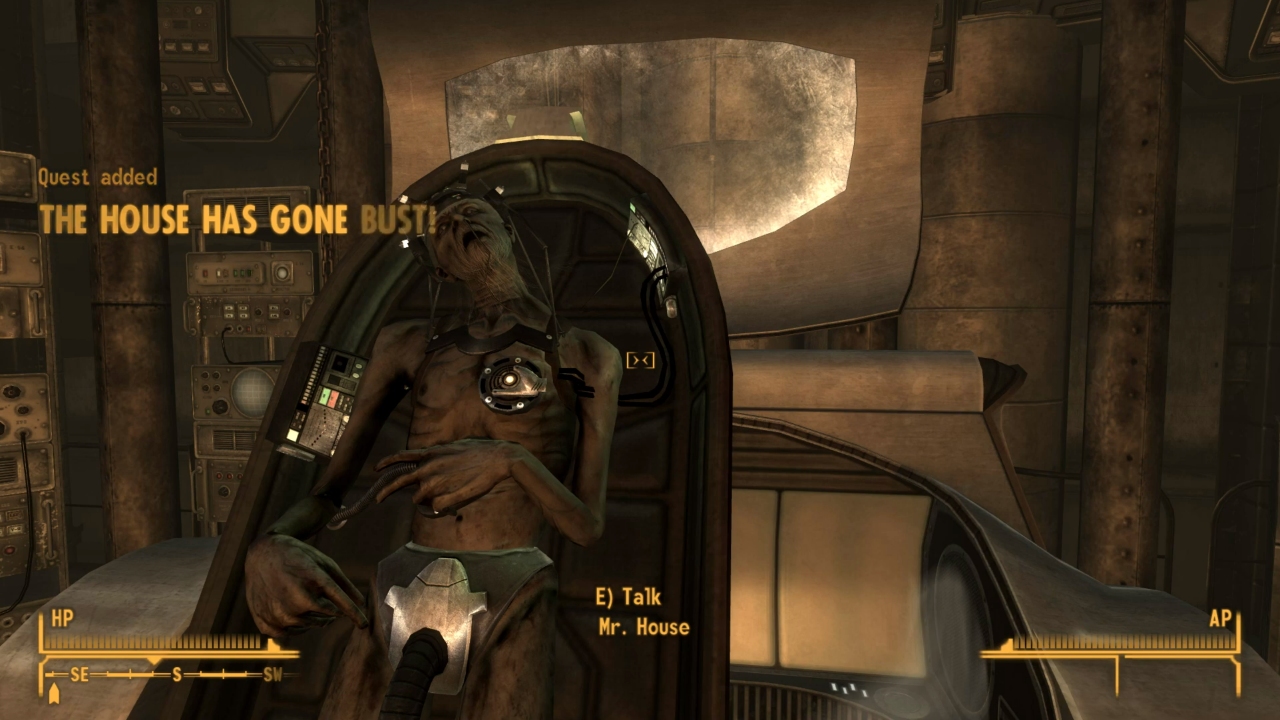
you can argue that Fallout: New Vegas is so particular in its attention to detail that you can't really do it again. it requires a very specific approach to game design where you make sure you have every possibility checked and thought out before you start laying down the digital foundation. it requires a smaller, tighter world than the type of thing that's made Bethesda famous enough to keep justifying these triple-A productions as they start to take almost entire decades to produce. it requires writers who are going to have to stretch to cover up some of the more extreme oddball variables the player can throw into their plot. i'd agree with all of this, it seems incredibly hard to design a game in that way, and i'm fine if not every game goes all in on that philosophy. at the very least, though, you would hope that even a little something from New Vegas might have rubbed off on Bethesda, that they might just consider the idea that not every named NPC in the game has to be treated like they're as essential as the main characters.
i bought the grav drive and haggled it down to 25,000 credits. i was able to visit the ECS Constant one more time to start a follow-up quest about one of the inhabitants wanting to leave the ship. Captain Brackenridge said i needed to bring her 50 potatoes to cover for the loss that the ship's farming department would take from losing a worker. then the ECS Constant just... vanished? it seems like it's supposed to appear randomly to reflect the idea that they're now grav-jumping across the galaxy looking for a new home, but the waypoint is permanently stuck in orbit over Paradiso with no ship to be found. fun. let's go back to the main plot, i guess.
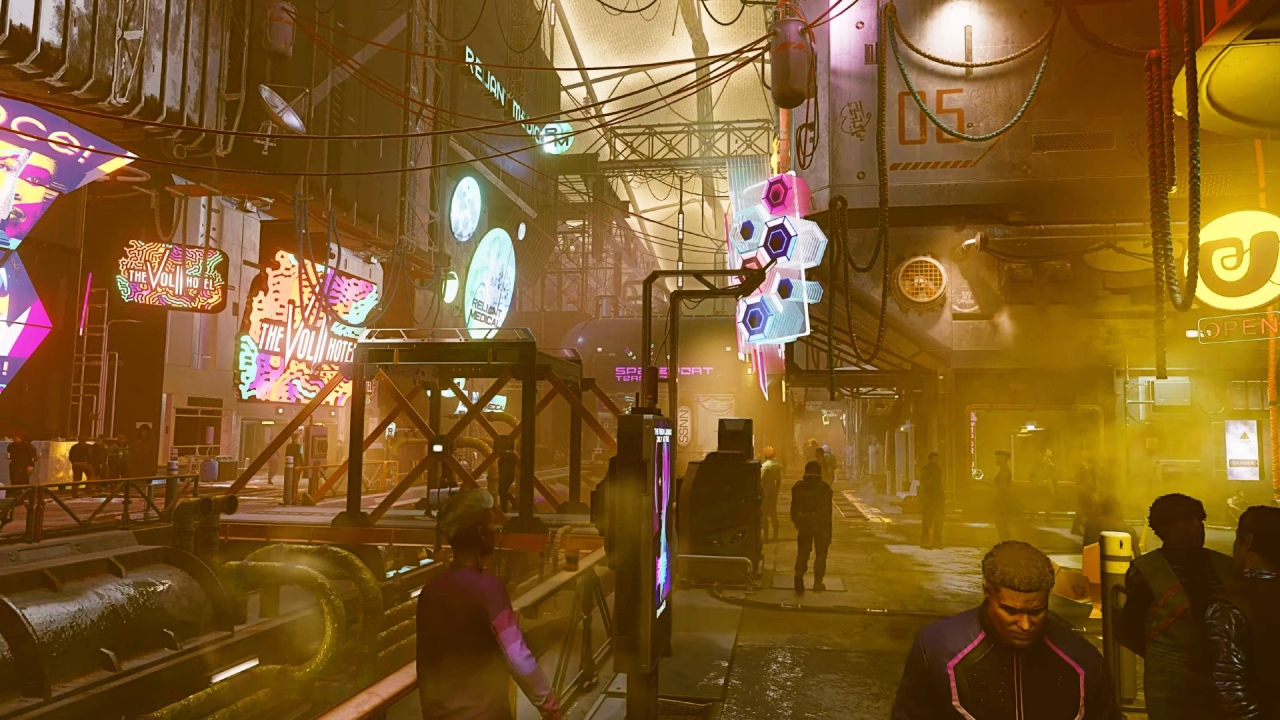
your next big stop is an unlikely pairing with Walter Stroud as he brings you into Freestar Collective territory, to the planet of Volii Alpha, in order to use his company's funds to secure an Artifact from the shady underbelly of Neon. it's a really easy setting to get lost in and i guess it's, by default, kind of my favorite of the game's few major settlements? it feels the most tightly packed and tonally cohesive, with all kinds of errands you can run, whether you're getting tangled up in the city's various gangs or helping its shopkeepers unionize against the corrupt security department. in a game that already feels subtly cyberpunk upon close examination, Neon just brings all those genre influences right to the surface. it's wildly unsubtle, there's nothing especially original about it, but it works well enough. maybe because i didn't play that other cyberpunk game, the one with the capital C and everything?
it's a fun quest that involves a bit of high-level corporate intrigue, balances out persuasion checks with combat sequences, and gives you time to soak in the atmosphere of the game's most atmospheric city. plus, you get to embarrass a CEO a lot in front of his girlboss wife, so that's cool. after i wrapped things up getting the Artifact, i spent a lot of time doing side quests in Neon, which made it a real shock when i remembered the quest wasn't completed yet. as you jump to orbit, you have your first encounter with the enigmatic Starborn, who arrives in a distinctly alien ship and warns you to stop your quest, saying that you're playing with cosmic power you couldn't possibly understand. from here on out, whenever you hit up a temple and obtain a new power, one of their all-powerful representatives will appear, menacing you with space magic not too dissimilar from your own and yelling vague hot air about 'glimpsing the abyss' or whatever. it's an interesting enough wrinkle, and that first frantic grav jump to narrowly avoid a confrontation with a clearly superior opponent does have some nice tension to it.
the addition of some kind of outside force tied to the Artifacts definitely sends ripples throughout Constellation, with some fun ongoing side conversations about the guild debating whether the Starborn are aliens or time travelers or something else entirely, but aside from ramping up the stakes and giving the crew a bit of doubt, it's pretty much business as usual. collect Artifacts, fly through hoops, kill Starborn guardian, earn all kinds of space magic like precognitive abilities or the divine power of insta-mining. eventually, you reach a point where the game gets weirdly strict, strict enough that i could immediately sense something was cooking in the background, as Constellation's satellite operator Vladimir takes approximately half the cast with him to do space station repairs while insisting that i have to do this next mission with Barrett.
much like most things in Starfield, it's not exactly original per say, but it is a decent enough deployment of standard sci-fi tropes, as you and Barrett head off to visit the eccentric collector Petrov, who's come into possession of an Artifact. a little persuasion here, a little 'shooting Petrov in the leg and getting him to surrender' there, and we're one step closer to the mysteries of the universe. we're also one step closer to whatever reason the game decided to make sure the characters were split up, but thankfully, before that ticking time bomb can go off, you get arrested! rad!
this brings us into the fourth faction quest, and the only one i actually played through, with the Crimson Fleet pirates. my understanding is that any type of bounty on your head will eventually queue you up for this particular opportunity, and the heist with Petrov just happens to be the point where the main quest unavoidably puts a bounty on your head - all unrelated to the other bounty i have from taking the Wanted trait, of course. you see, you've caught the attention of the United Colonies' SysDef department, a task force specifically dedicated to dealing with piracy and space crime.
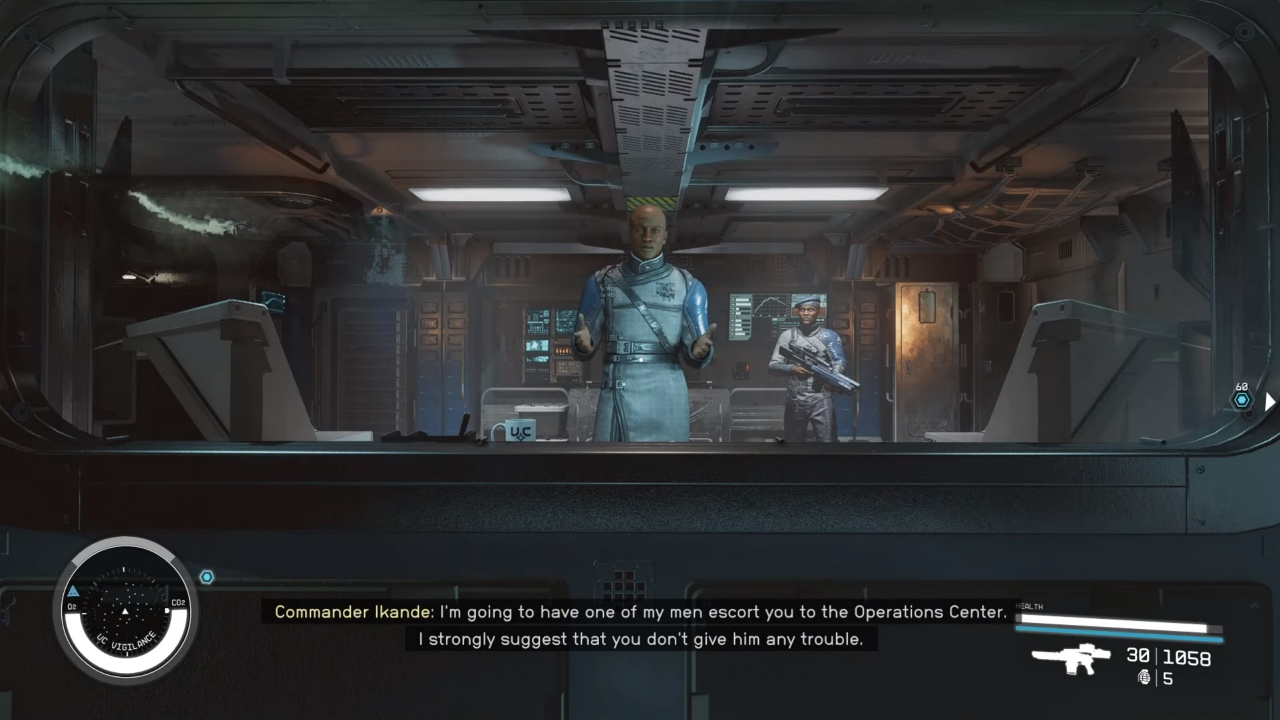
yes, even the faction quest about joining the pirates in this game is somehow a cop thing, because Commander Ikande thinks that you have what it takes to infiltrate the notorious Crimson Fleet on SysDef's behalf, and he's willing to blackmail you until you agree. it's time to go be a narc.
i will be gracious to Starfield here and admit a little bit of metagaming and misinformation took place on my end. i knew, loosely speaking, what the four big factions with full subplots were, and i knew i would probably only be interested in doing the Crimson Fleet stuff, if anything. somehow, in spite of me not jumping on the special early access edition, it still seems to have taken a long time for people to figure out how this particular side quest can actually start. i did a bit of research and at the time, everything i was seeing implied that joining the Fleet as an undercover cop was your only inroad. it's since come to my attention that you can put your foot down a little more and your cellmate will instead lead you into the quest, but for reasons i'll get into as we unpack this chain of events, it's a bit of a zero-sum game.
one of your first major assignments once you've gotten a contact with connections to the Crimson Fleet is to prove your loyalty by doing a favor for the pirates' second-in-command, Naeva Mora. the last guy she jumped into the Crimson Fleet decided to back out on them, and she wants him dead, having finally tracked him down to a new position working on a medical supply ship under an alias. even outside of whatever your own personal feelings might be, Commander Ikande has emphasized that even if this is a high-stakes undercover operation that his entire career hinges on, he really, really doesn't like you killing people, so you have a vested interest in not doing that.
i, personally, have no real skin in the game about whether this guy lives or dies, but ideally things shouldn't have to get too messy, so i decide going in that i'd like to try talking this out. the captain of the ship steps forward and resolutely refuses to hand over his crewmate, no matter what his pirate background might be. excitingly, the game even lets me use that Wanted trait to pull out some unique dialogue about how i know what it's like to live on the run! that's almost starting to get close to some actual roleplaying informed by the character i chose to create!
unfortunately, no matter what i tried, across multiple quicksaves and using my cosmic power of precognition to read what every response might be, i think Austin Rake can only be dealt with in... let's say two-and-a-half ways. you can just get in a fight with the entire crew at once, whether by shooting first or failing to win them over in a persuasion check. you can convince the crew that they need to gang up and kill Rake to save themselves. or, in the only peaceful outcome here, you can hatch a scheme with the captain to get Rake out of harm's way... and into a maximum security SysDef prison cell.
the game gave me a thing i could say because of the Wanted trait, but it doesn't actually feed into any unique solution for the problem. Captain Tallahassee cannot use their criminal wit and smooth-talking charm to help Austin Rake out of this jam. you are either full-blown okay with murder, or full-blown okay with putting this guy in jail for life, under the watchful eye of the Space CIA. this disappointing choice really set the tone for a lot of what was to come with the Crimson Fleet quests - i don't think it ever got so unnecessarily binary like this again, but it speaks to a deeper underlying issue with how Starfield has a blunt, inelegant approach to 'making the tough decisions' like that.
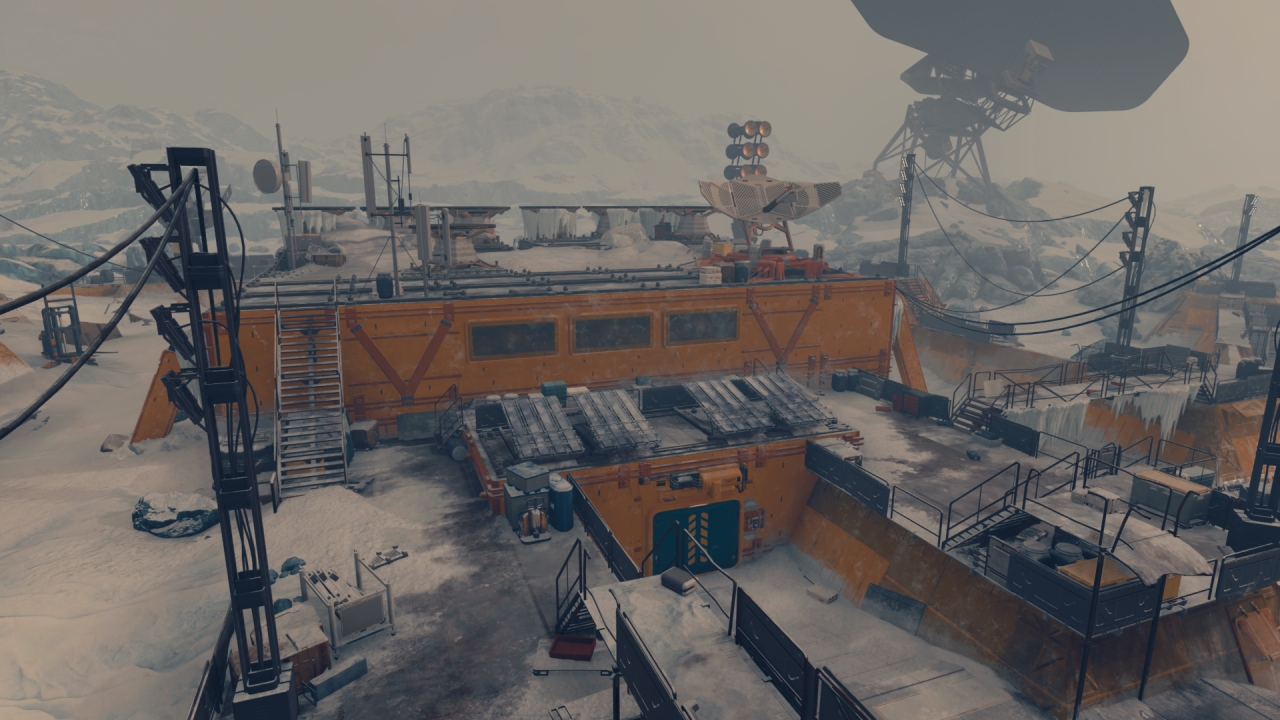
as if to twist the knife a bit more on all this, your first mission as a proper pirate of the Crimson Fleet is to accompany the leader, Delgado, on a mission down to an abandoned United Colonies jail facility. see, the Crimson Fleet didn't get its start as just a powerful crime cabal or a mafia-style family - their original founder, Jasper Kryx, was a notorious pirate, locked up and treated like an animal under the surface of a barren, frozen world. the Fleet, as it stands today, is the result of a prison riot Kryx led about 100 years ago, overtaking the control station in orbit over Suvorov and establishing a code of solidarity and honor between disparate thieves.
sociopolitical implications aside, it's a really fun quest, leading you through an old abandoned prison as part of Delgado's obsessed search for Jasper Kryx's final lost treasure trove, accompanied by a fellow new recruit who immediately jumps to the idea of killing Delgado together in a way that leaves you wondering if he's there to test your loyalty or if he's just that reckless and dumb. but, sociopolitical implications back to the front for a moment - i think this wrinkle in the Crimson Fleet's story, this element that they were started as a revolt against inhumane prison conditions, is a great example of an area in which Bethesda's writing falters.
i think the people writing Starfield are at least a little in touch with the world, enough to understand that people have complex feelings about criminal justice and the prison system in the year 2023. if they weren't, it wouldn't be such a recurring undertone of the Crimson Fleet material in this game. no art is made in a vacuum, even if Bethesda's game design can sometimes feel a little frozen in time. you can even visit characters who've been arrested throughout the SysDef operation in the brig and have some conversations with them. the guard up front will stop and have a chat too, opening with a charmingly quirky obsession with cleanliness before pivoting into a pretty harrowing observation about how the United Colonies has treated prisoners too harshly before, but you can't go too easy on them either, wink wink.
to me, i think the heart of the issue is that Bethesda is afraid to have evil in their games, and not out of some sense of self-censorship and good taste. no, Bethesda is insecure about their stories being perceived as overly shallow. if the Crimson Fleet were just pure bad guy pirates, that wouldn't be very deep and exciting in your massive immersive epic RPG world. but they are also, on some fundamental level, still clouded by centrist NIMBY politics. the pirates are people too, and they had a reason for their revolt, but that's about as far as the game goes when it comes to extending empathy and interrogating why crime happens. you have very few options, if any, to meaningfully confront the United Colonies about their part in all of this. the government is capable of messing up and mistreating people and creating their own problems, sure, but fighting the government about it would be fundamentally bad, because clearly the United Colonies are the good guys, because... rule of law, and civilization, or whatever.
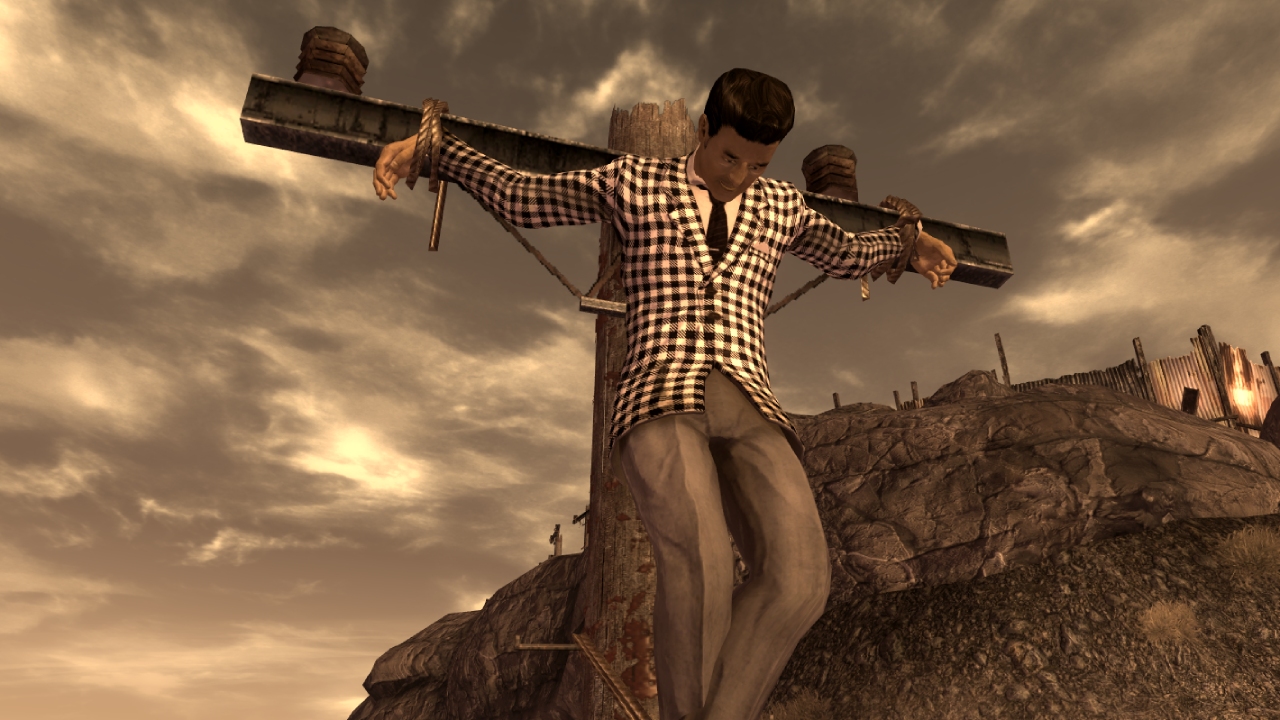
and, as with most issues in Bethesda games, we can take a look at Fallout: New Vegas to see how it's done better over there. Caeser's Legion are about as evil as you can get. misogyny and homophobia, pillaging, burning towns to the ground, enslavement and human trafficking, the whole nine yards. they are bad people. you can go and debate Caeser about his ideology, and he'll go on about how he's following in the footsteps of history's great philosophers and conquerors to create a new society that can endure the cruelty of a post-nuclear world, but you can also see firsthand that the man relishes in the inhumanity of it all. the game gives you the option to side with him, but it just hits differently than the usual 'evil Bethesda' faction in some way i can't quite put my finger on. if you wanna side with the evil wizards or the bandits or whatever in other games, sure, whatever, but New Vegas goes out of its way to expose you to so much of the impact of Caeser's deeds that i feel like it says something more about the player for choosing that path, even if it's just a sort of Undertale-esque curiosity to see even the worst ending played out.
one of the great benefits of not shying away from that level of evil is that it lets you start actually unraveling what good looks like in comparison, and not in a toothless "centrist or libertarian" way that keeps popping up in so many of Bethesda's stories. the NCR are on the brink of having a breakthrough in their stalemate against Caeser's Legion, but they're also eager to annex New Vegas and keep manifesting destiny the minute this is all settled. you can trace all kinds of problems in the world back to them, whether it's wasting resources on establishing a police presence in the Strip, or sending mercenaries to a peaceful Super Mutant settlement in the hopes of driving them out and/or justifying a show of force against them. the ways in which you can engage with them, hurting or helping their cause bit-by-bit, and the game's capacity to handle a mixed reputation, creates so much depth. there's a whole side quest about a high-ranking officer who's grown disillusioned with the war and has started falsifying reports back to NCR command in the hopes of getting them to pull back - it's entirely optional, but that guy has like, 11 different endings he can wind up with, ranging from shooting himself in his office in shame to running as an anti-imperialist senator.
there is no such thing as a mixed reputation in Starfield. you cannot change people's minds or the courses their single-minded goals will lead them down. you might get a dialogue option where you get snippy with Commander Ikande and remind him you're not his friend, sure, but that's just another funnel to all the same missions, all the same conversations, all the same accolades about how you're doing the right thing and making the galaxy safer. the kindest thing you can do for the Crimson Fleet in this scenario is getting some of their members out of harm's way by entrusting them to the same oppressive prison system who's failures led to their creation in the first place. even then, that incredibly threadbare sense of sympathy is extended seemingly at random to only a handful of the characters.
then, of course, there's the counter-argument - if i hate SysDef so much, why do i keep working with them? throughout the various steps of helping Delgado assemble a plan to raid a GalBank vault-ship stranded inside a gas giant, it's not too hard to avoid killing people just by nature of how i play the game, so i'm still in Ikande's good graces up to the very end, even if i'm intentionally avoiding handing over too much evidence against the Fleet. by the time i've secured Jasper Kryx's long-lost final score, the game is still telling me i can take it to either of the main factions.
first of all, it's kind of crazy that one of the game's big faction subplots involves you carrying around a space briefcase full of potentially billions of space dollars, and there's no option to just take it for yourself and piss everyone off. right? that feels like it should be a thing, and characters in the game will talk to you like that's an option you could have taken, but you can't, because it's only here where Starfield establishes that all this currency is on the blockchain or whatever the fuck and you'd need a master hacker with SysDef or the Fleet to decrypt your loot.
as for why i ended up holding my nose and taking it back to SysDef? i was trying to meet Starfield on its own terms, i guess. you can choose the Crimson Fleet, sure, and that's what i really wanted to do, and what i felt like my character would really want to do. the issue here is the ways in which the game can and can't actually create consequences for that decision.
obviously, if you hand Kryx's Legacy over to the Crimson Fleet, SysDef isn't going to be happy with that and you'll end up boarding their flagship as part of the final confrontation between these two factions. there'll be fighting and bloodshed and declarations that you're a traitor to the United Colonies. but... Constellation's headquarters are on New Atlantis, so we can't go locking players out of that, right? so you're a traitor, but only the CIA seems to really know or care, because the rest of the United Colonies is still super-chill about you. you can even still sign up for the UC Vanguard! wouldn't want players to miss out on the opportunity to do all the quests, no matter how much that doesn't make any sense!
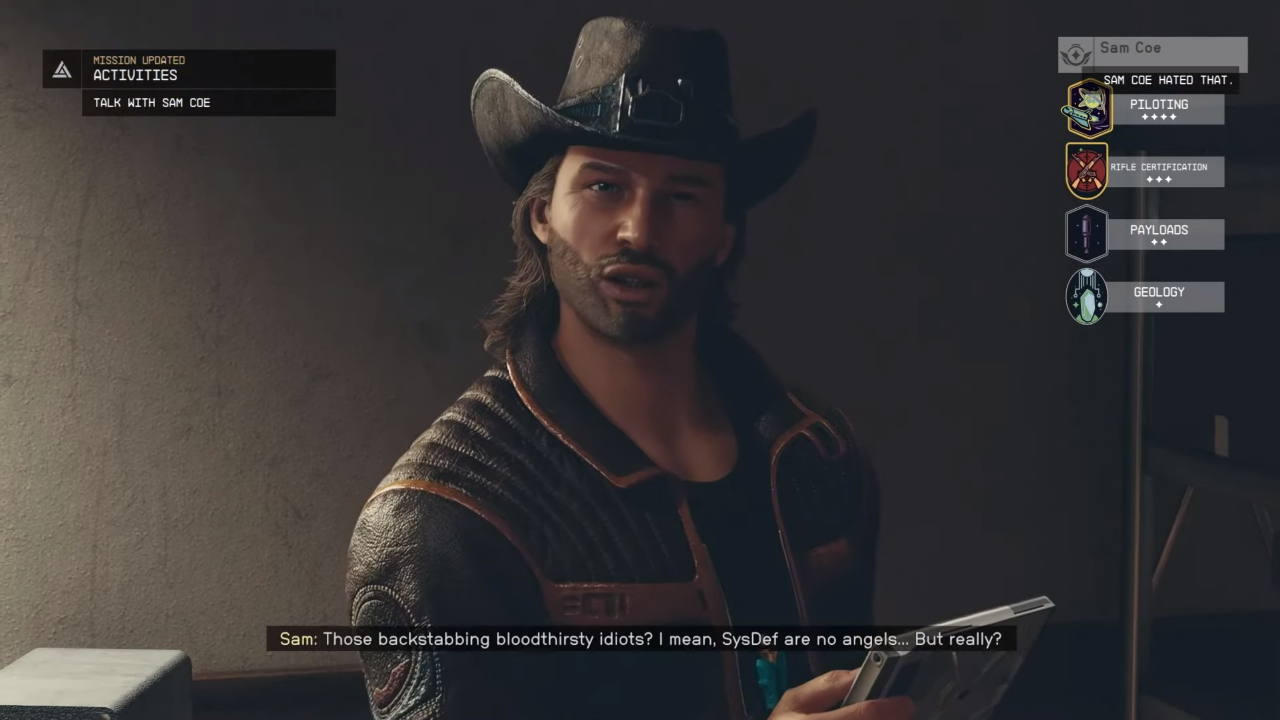
so Starfield isn't designed in such a way where it can lock you out from any meaningful content, but it also still feels the need to let you know you picked the Bad Guys in this situation, so how does it accomplish that? passive-aggressive shaming, by way of the companions. my understanding is that all four companions - even the morally gray Andreja, who openly expresses disgust with the idea of SysDef getting to sweep this all under the rug if they win, and Barrett, who constantly seems to be making friends and pounding back brewskis with pirates - will hate your guts if you opt to side with the Crimson Fleet. no ifs, ands, or buts about it. no real opportunities for me to express the thing i'm thinking as a player, which is that SysDef is full of amoral monsters who blackmailed me into their plan to begin with, who pretend to have the high ground with their 'no killing, even to maintain cover' policies but proceed to dehumanize their opponents every step of the way.
obviously these are fake, digital people. their opinions don't really matter to me and my understanding is that it's just as easy to make them like you again as if nothing happened after they've had their single opportunity to tell you that you did a bad thing. it's not like i'm afraid of stepping on people's toes. hell, i'm not even opposed to having companions who do have strong disagreements with the player's choices - i think that makes perfect sense and adds depth to the world, because yeah, not everyone is going to agree with you all the time. the problem here is that it's everyone.
there are, to some extent, more companions available outside of Constellation's ranks, but... not really. most of them exist solely for the sake of crew-building, applying different perks to your ship. they can have maybe a single full conversation with you, but that's all they're ever going to say. they don't participate in the plot, they don't have unique things to chime in with while you're on missions. when we dip back into the main plot, it'll become even more incredibly clear that this game is fully focused on the four characters you can recruit from within Constellation. all four of them, no matter what they might imply beforehand, are all disgusted with the idea of you helping the Crimson Fleet.
remember that thing Sarah said, about how Constellation is full of risk-takers, people from all kinds of backgrounds who aren't afraid of working on the edge of the law for their common goal of exploration and discovery? remember how Vladimir, the friendly satellite operator who everyone in Constellation loves, is an ex-Crimson Fleet member himself? remember Barrett chumming it up with those pirates?
this has seemingly already become a hot button issue within the nascent Starfield fanbase, with people debating about the nature of what Sarah tells you at the start of the game, and the arguments often go in circles until they arrive back at that immediate gut feeling i got when i first heard that dialogue - you aren't 'supposed' to actually think Sarah meant that. that was the game telling you something, and trying to assign interiority to a character in a video game is a fruitless endeavor. even if Bethesda prides themselves on making immersive worlds meant to be lived in, you also have to be willing to fully disengage and know when a character's actually talking on behalf of the game designers, because It's Just A Game, Bro.
this type of game design is honestly really prevalent throughout all corners of Bethesda's titles. it makes no sense that the same person can be a traitor to SysDef and then go become a first-class UC Vanguard, and also, sure, why not, Freestar Ranger as a side gig too. Starfield allows all these contradictions to exist, and the ball is in the player's court to fill in the gaps and disengage if that type of contradiction bothers them. the game is built to accommodate the player who wants to do everything for the sake of doing it, and the only way to narrow that down and define who your character really is in this world is to keep ignoring things, rather than the game creating exciting new opportunities out of your choices.
here to perform its eighth encore as a point of comparison in this rambling diatribe against Space Game, it's Fallout: New Vegas! i think a key difference between the design of these games that isn't quite so starkly 'Starfield bad, New Vegas good' is the way these games handle factions. Starfield has a faction-agnostic main storyline - it's not a story about the politics of this world, it's a story about unraveling the mystery of the Artifacts and getting space magic and maybe learning a valuable lesson about the nature of human curiosity along the way. New Vegas is nothing but politics. the factions aren't optional chains of side quests meant to flesh out the world, they're the plot of the game, and you have extreme degrees of influence over how they play out.
in case it wasn't clear enough from how i've talked about the various factions negatively, i went for New Vegas's 'wild card' ending, in which you stumble upon Benny's plan to use the coveted platinum chip to his own ends and screw everyone over equally. to some extent, the independent route exists as a mechanical necessity - because you can kill anyone and make all the major players turn on you, you need some kind of neutral way to end the game, and having a robot who can transfer his consciousness into a new body over and over creates a quest giver the player can't permanently lock themselves out of. in my playthrough, though, i picked the independent route because it just genuinely reflected the way i felt about the conflict. the Legion are terrible, so i was willing to help the NCR deal with them, but it'd be bad for everyone involved if the NCR overextended into Mojave territory. Mr. House is just a capitalist dipshit who should be blasted at the earliest convenient opportunity, so no need to worry about him.
with the way i played New Vegas, the game's first act ended with Benny escaping from our confrontation at the Tops casino alive and winding up a prisoner of the Legion, giving me my first opportunity to come face-to-face with Caeser himself. as Caeser explains it, his fort happens to be built atop Mr. House's personal vault of Securitron drones, which ties into the true purpose of the platinum chip as an activation device. a lot of people want the Securitron army online and active, whether it's Mr. House himself or Benny trying to hijack control of the Strip. Caeser, on the other hand, obviously doesn't want the Mojave receiving any sort of reinforced protection to stop his conquest, and sends you down to destroy the facility instead.
to some extent, the way you're 'supposed' to do the independent ending is by commanding this Securitron army yourself at the battle of Hoover Dam, giving you the military backing to stop both the NCR and Legion in one fell swoop. i chose to blow the Securitrons up.
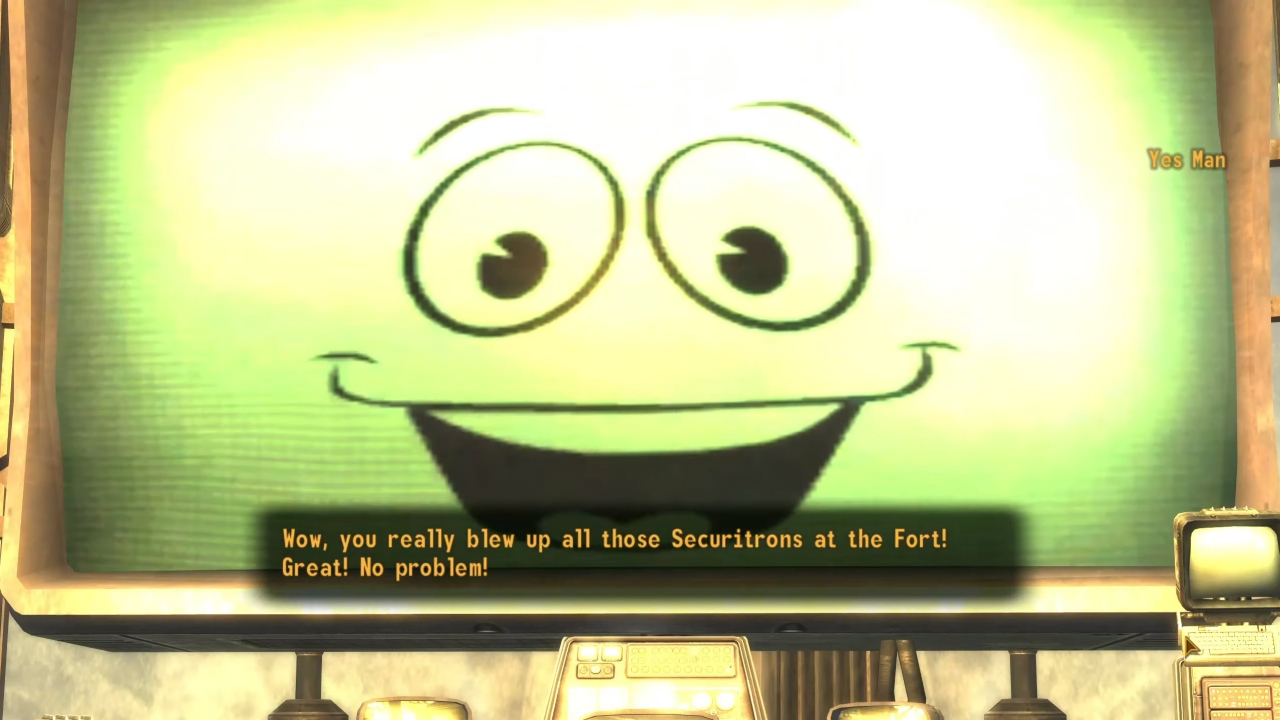
it sucked in the sense that it was what Caesar wanted, but i was willing to take that risk and find other ways to deal with the Legion. by this point in the game, i was deeply invested in the fictional politics of the Mojave, and i knew that i wanted to put the people first, people like the Followers of the Apocalypse or the Kings of Freeside. i looked at the situation and i decided that nobody would benefit from having the kind of monopoly on violence that an autonomous robot kill-squad gives you, not even myself. i wanted to de-escalate, and that was my way of doing so. this choice really did reverberate throughout the entire latter half of the game, with unique dialogue from characters noting that i was taking an absurd risk by inserting myself into this conflict without an army to back me up. for the same reasoning, i didn't help the Boomers retrieve their lost B-29 bomber, and i had to turn to the washed-up ex-Enclave soldiers for aerial support. when it came time to enter the fray at Hoover Dam, Yes Man was passive-aggressively 'thrilled' at my 'bravery' to destroy our robot army, and ultimately, i had to render the hydroelectric plant inoperable, to remove any reason for the NCR to try and stake their claim in this region. that, too, was a difficult price to pay, but given i had brought the HELIOS One solar energy station back online and distributed power throughout the Mojave, i was willing to have faith that the people of Vegas could still thrive on their own two feet.
the Fallout Wiki itself says that there is, and i quote, "no real benefit in destroying the Securitron army", no matter what path you're on. Mr. House and Yes Man both want it operational for their endgames, and the NCR and Legion both end up wanting you to kill Mr. House, which also shuts down the Securitrons. that's a big decision i made that, in a practical gameplay sense, only served to make things more difficult for myself. but it was a decision i made because i started caring a lot about the nature of this fictional conflict, and the game let me do it, and it reacted accordingly in so many ways. i felt a certain way, and the game gave me the tools to express that viewpoint and took measures to make sure it changed the world around me, even if it was counter-intuitive and senseless. often times, those reactions meant cutting me off from certain ways the game could end. there is no talking Mr. House down once you've strayed far enough from his grand vision, and the NCR eventually caught on that i was undermining their authority more and more with each big step.
you would think that in a game like Starfield, wherein the factions are entirely optional and disconnected from the main story, that Bethesda would feel comfortable drawing a line in the sand and saying "no, if you start picking sides, certain people aren't going to let you waltz in and work with them anymore". they aren't, though. this whole tangent has been to come back to that point - mainline Bethesda games are designed first and foremost for players to mine them dry. the ideological differences between the United Colonies and Freestar Collective can never truly matter, because that'd mean telling a player they can't have their cake and eat it too. if you decide to try and engage, if you want to care, the onus is on you as a player to ignore major traps of ludonarrative dissonance rather than the game itself meaningfully reacting to any decision you make.
so, i wanted to do what little i could to care. maybe it was ill-advised, because Bethesda games seem incredibly poorly equipped for that, but i wanted to put myself in my character's shoes and give a shit about what the people closest to me might think. i took the money to SysDef. it's been made clear throughout the quest that this lost treasure might make or break the long-term survival of the Crimson Fleet, but there's no way to talk SysDef down from a senseless attack on their headquarters. and so, the game sends me in to clear out the spacestation. all of Commander Ikande's moral righteousness about not killing innocent people is gone - these are pirates, they brought it on themselves by doing crime. that girl who handles the spaceships, who's in a loving relationship with Naeva? that bartender who you gave emotional closure by finding his long-gone lover's ring? don't feel too bad about gunning them down in cold blood.
as far as i can tell, there's no way to save some of these people, because they don't get the option of 'mercy by way of a prison cell'. i tried using my space magic that calms and disarms enemies, but not only would my companions gun them down anyways, but they'd pick their guns back up and storm in on me while i tried to progress further into the station. as i made my way through, i picked up a set of audio logs scattered throughout the station, depicting an interview with Jasper Kryx about the origins of the Crimson Fleet, about how the United Colonies mistreated prisoners and eventually created SysDef as a form of saving face, allowing the Navy to look heroic and successful while the new department ate the losses of being unable to clean up their own mess.
Bethesda is caught in a fundamental struggle with how they write their 'evil' factions. just like the restrictive, mechanical choices they offer up for their players, they want to have their cake and eat it too. they want to create the illusion of depth, to lightly poke and prod and suggest that maybe both sides have a point. they'll imply a motivation behind morally dubious actions, because they think evil for the sake of evil is bad storytelling, but when it comes down to it, they have no interest in letting you actually pull on that thread and engage with the root causes, and their solutions to these stories often fall back into black-and-white thinking when the stakes actually start mattering. the pirates have their reasons, but at the end of the day, your options are that criminals are sub-human fodder who don't deserve your sympathy, or that you simply love lawlessness for no reason yourself.
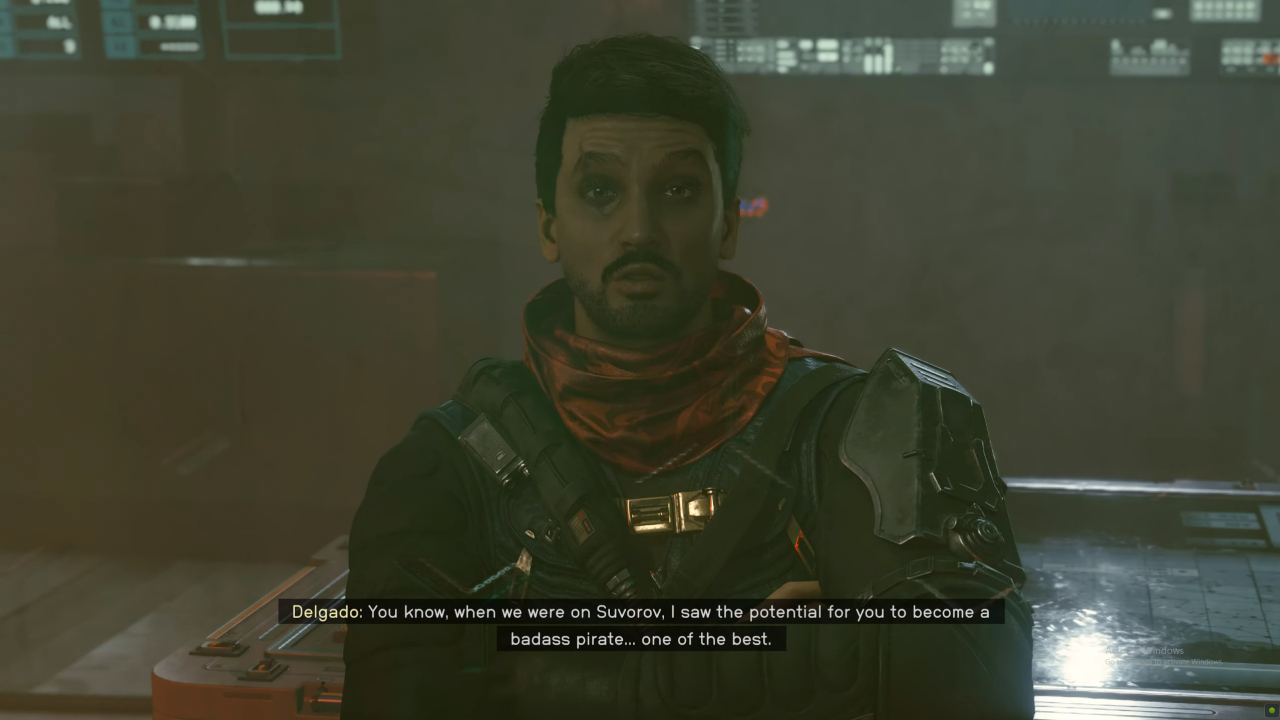
in the end, i did what i could and managed to talk Delgado down from blowing the entire station up. when he gives his big speech about how deep down, we both know that i'm really good at being a pirate, i get that it's supposed to be bittersweet. it's one last moment of Bethesda trying to make you ponder both sides. it did nothing for me. he's right and there's nothing really complicated about it. i don't want to be doing this, but not in some tragic 'hard choices' kind of way. i don't want to be doing this because all the game's ways of letting me engage suck.
returning to a ship full of clapping soldiers commending my service was honestly one of the more sickening things i've experienced in a video game. congratulations on raiding a spacestation where people lived entire lives! you killed dozens, including people you did personal favors for! way to go, troop! there's a moment earlier in the quest where Commander Ikande says that the money Jasper Kryx was after is technically Freestar Collective property due to some old war treaties, and that despite the friction between these two nations, he wants to make sure it ends up in the right hands. when you finish doing his dirty work, he gives you a payout of 250,000 credits, and if you point out that that's explicitly against what he said he was going to do, he just kind of half-heartedly says most of it will end up in the right place eventually and that nobody has to know about this, wink wink. you have no option to decline this reward.
over the next few hours, each of my companions gets the opportunity to say their piece about the tough calls i had to make. this is where they'd be chewing me out as a heartless scumbag traitor if i had helped the Crimson Fleet. as it stands, i'm able to take dialogue options that allude to not being fond of what i 'had to do', but it's all just hollow, because i know that reluctance and doubt don't really continue to go anywhere after this. unsurprisingly, the most tense of these conversations is with Sarah, given her ex-military background. surprisingly, the game actually has a pretty good option for an answer when she asks me how i stayed true to SysDef - i tell her i didn't want to disappoint my friends, and she's flattered.
then the conversation shifts to what we think about Delgado. the three options essentially boil down to 'he was criminal scum', 'he fell in with the wrong crowd', or 'he was cool, actually'. by the time i have this talk, i'm honestly kind of numb to this whole plotline and i don't care anymore. i don't actually care about if Delgado was right or not, because he was a one-note pirate obsessed with one single goal in a story that pretends to understand that crime doesn't happen for crime's sake, but seems ultimately unable to extend any understanding towards criminals. i say he was cool, but only because i know it's probably the last time this is ever going to come up before i go back to doing main story stuff and it's the closest i can get to actual expression of how tired i've gotten of all of this. Sarah disliked that. i didn't really care.
man, if Barrett was still alive, i'd hope he'd have my back about this, but he'd probably let me down too. oh, right, Barrett died in the middle of all of this, like, permanently. back to the main quest to catch you up on that!
i knew i felt a scripted sequence coming on when the game forced a companion choice for me and made sure that Constellation were split up between their satellite and mansion, which is part of the reason i got so deep into the Crimson Fleet side quests, as a way of putting off whatever major act shift was coming next. when those quests happened to put me back near New Atlantis for a while, i put that sideplot on hold and returned to the Lodge, where things broke out into an immediate panic as it becomes clear that one of the Starborn has launched an attack against Constellation. they've already attacked the satellite, leaving most of Constellation injured with Sam Coe actively bleeding out as we speak, and they're heading for the Lodge next to take back the Artifacts. the game pits you with what is actually, for once, a pretty genuinely tough decision - do you stay at the Lodge and evacuate with the Artifacts, or do you go up into orbit to save a friend?
as a player of a video game, i see what's happening here and all its mechanical underpinnings. the game has taken the two companions i have the highest affinity with and set them up in a scenario where i have to choose who makes it out of this emergency and who dies. it's a rare moment of permanent consequence in Starfield, and it honestly took me a while to mull it over, including starting to play it out one way, going to bed, and waking up the next morning and deciding i wasn't satisfied with what i had done. perhaps taking a sample of both sides and doing a bit of save-scumming takes me out of the immersion a little bit, but the long-term consequences are going to stick with the rest of my playthrough no matter what, and i'm not here to prove anything to anyone by engaging a video game recreationally, so i'm fine saying 'actually, i don't feel good when this virtual child yells at me that it's my fault her father bled out'. when i think about my character in this sudden crisis, i think they'd be willing to entrust the Lodge to Barrett, their psuedo-mentor who brought them into all this in the first place. i know mechanically it's a bad call, but if i'm still trying to care about Starfield and its world, it'd be the kind of split-second choice my character would make.
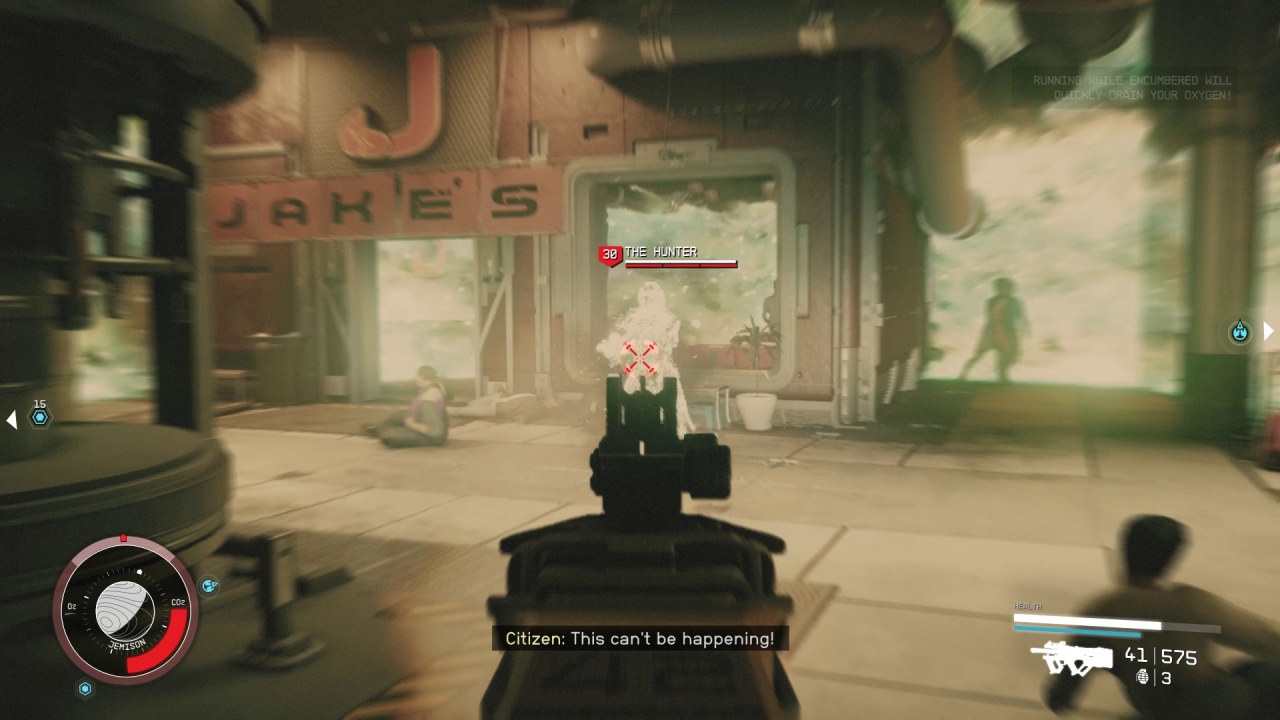
having dabbled in both options, i can at least know for sure that the primary difference here is simply who lives and who dies. the order of bouncing back and forth between orbit and New Atlantis might change, but either way, you manage to smuggle the Artifacts back to your ship after an intense chase that ruins the entire city, as the Starborn demonstrates just how all-powerful you can get with enough Temple magic. when confronted in orbit, it becomes at least somewhat clear that this is a different individual than the one you ran into on Neon, if you're paying attention to the names of the ships you're hailing. if anything, the captain of the Scorpius seems mostly bemused that you made it this far, pondering if they've underestimated you and opting to 'enjoy the long road' instead of continuing their rampage. with a few cryptic hints about a bunch of new proper nouns like the Armillary and the Unity, your new worst enemy vanishes, and we begin the final act of Starfield's main quest.
to give Starfield's writing its due, i do think they handle the permanent loss of a team member in some interesting ways. obviously, the story has to be modular enough for it to potentially be any of your main companions, but Constellation is small enough that the Lodge does feel noticeably emptier, and you're even given some leeway in how your character handles the grieving process, whether it's attending your friend's funeral or skipping out because you don't want to face that sense of loss head-on. i can't speak to every permutation of the choice, but i can say that before long, Sam took the difficult plunge of asking me why i chose to save him, and while the short answer is 'because you have a kid to raise', it was a difficult and messy situation to approach.
of course, this is still a video game with an ongoing plot involving space magic, and we can't hold off for too long. Matteo gives us a quest to look into that Unity thing that the Starborn mentioned because it sounds familiar from some of his religious background, giving us an opportunity to interact with the three main faiths of this setting. they haven't really come up much in my playthrough, but as a little crash course since it's semi-important now - the Sanctum Universum believes in a capital-g God who wants mankind to inherit the stars, the House of Enlightment is really more of an atheistic mutual aid group, and House Va'ruun are a mysterious theocracy who worship a Great Serpent, having waged at least one holy crusade against the United Colonies in the past before largely retreating to the edges of known space.
as this quest reveals, these three religions all happen to share a bit of secret history with a mysterious 'pilgrim', who explored all corners of the galaxy, imparting these cultures with his wisdom and seeming awfully concerned with whatever Unity is. the actual payoff here is mostly just a little scavenger hunt to lead you to the game's big 'all shall be revealed' moment, but i do like the build-up of hearing these different stories passed down through the lens of different cultures, and finding the pilgrim's own writings, which speak to a frustration with us mere mortals and debate whether it is better to find contentment or continue striving towards his mysterious greater goals.
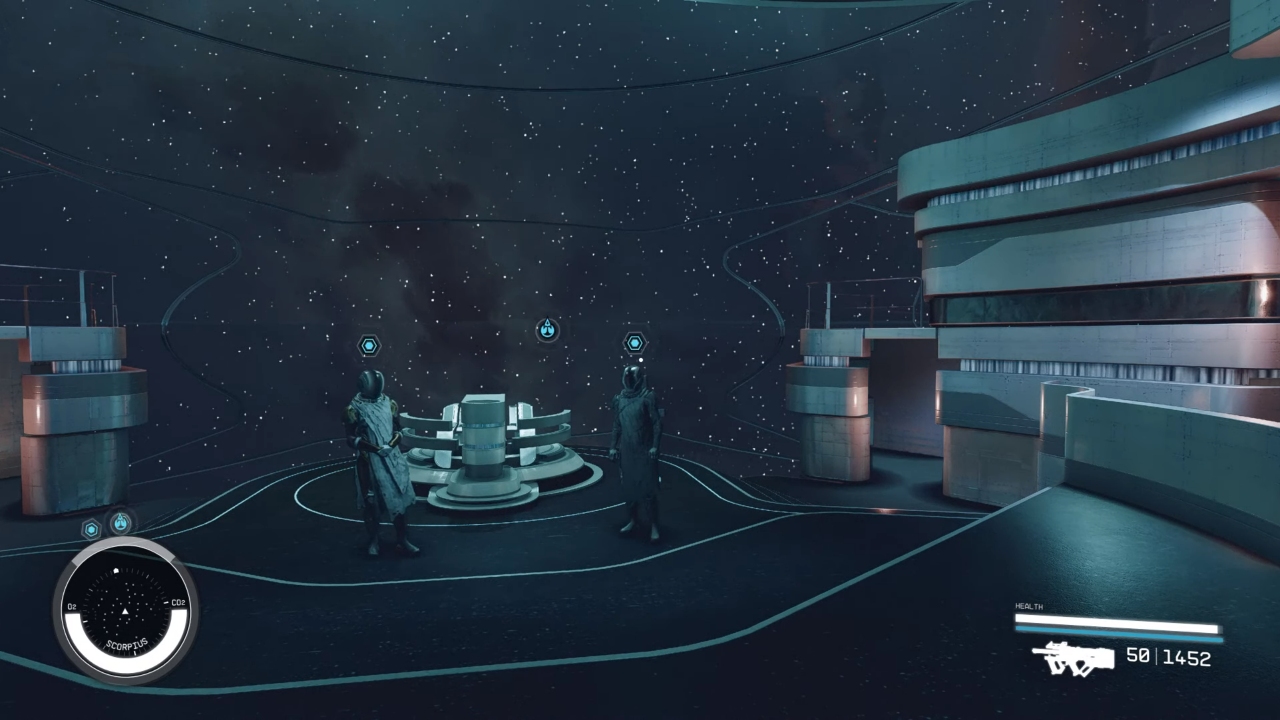
once you've followed all the clues, though, you find yourself in yet another encounter with the Starborn. the two primary representatives who've been antagonizing you throughout your journey - now identified for the first time, 'the Emissary' who got all foreboding on Neon and 'the Hunter' who attacked Constellation directly - are a little surprised that you've arrived here, but claim they've been talking about you and that it's only fair you get a seat at the table and starting learning about what's really going on since you've gotten so deep into the mystery already. what follows is an opportunity for a lot of talking and a lot of follow-up questions, so i'll do my best to just lay it all out in a way that makes it easy to keep track of as we dive deeper into what it all means.
the Artifacts, when all gathered together, form the Armillary, a gateway into the Unity, which is really just a fancy way of saying the multiverse. the Starborn are just people who have gone through the same process as you - they've developed the same magical abilities, gone on the same type of hunt for the unknown, and they quite frankly don't know anything more than you do about who actually created all these things in the first place. what they do know, however, is that repeating the process over and over makes them stronger, which is why their abilities are so much more potent than yours. because they're not a monolithic faction, they have some strong disagreements about what proper protocol should be, though. the Emissary believes that Starborn interacting with regular people will inevitably lead to disaster, and that they need to take it upon themselves to judge who is worthy of ascending to their ranks, even if it means the occasional show of force to scare lower lifeforms off. the Hunter, on the other hand, believes that anything goes in the hunt for power, that whoever can get a hold of the Artifacts is more than welcome to try and that the Emissary is hypocritically taking the high ground.
so, that's what's been up with their interactions with you this whole time. the Emissary wants normal 'unworthy' people to back away from the whole ordeal, and the Hunter thinks it's all fair play, whether that's in terms of him murdering your friend or you exceeding both of their expectations. indeed, they've had this exact meeting countless times, trying to win each other over in a fruitless endeavor, and they've never seen you, specifically, getting quite so close to changing the scenario. to reinforce both of their respective points about this infinite unending cycle, they both reveal their human identities to you - the Hunter is a version of Aquilus, the Universum Sanctorum priest who told you about the pilgrim in the first place, and the Emissary is a version of... well, whichever companion died in your playthrough, so in my case, Barrett.
this whole third act twist is a lot to unpack, and quite frankly, i'm not sure i'd have cared enough to write about this game so much without it. it's definitely not what i was expecting going into Starfield, and i guess just to put some initial cards on the table, i think it's really cool and interesting in some aspects, although it also falters in a few key ones.
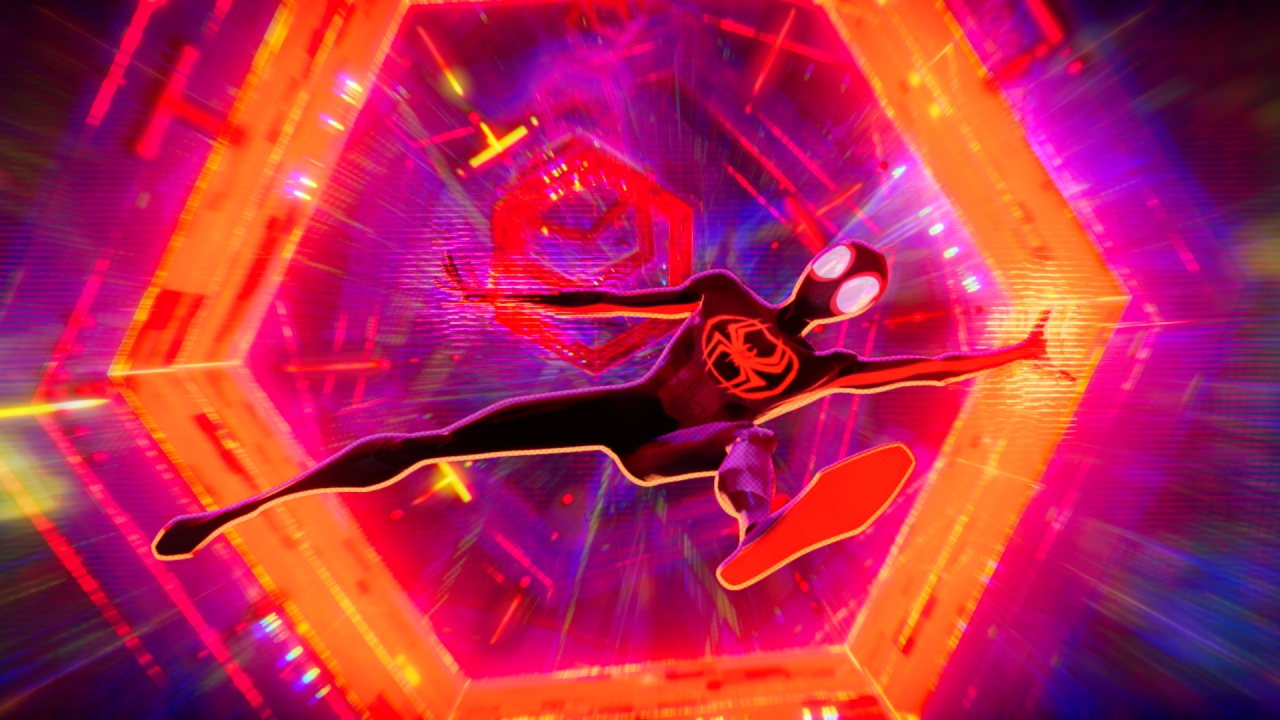
i have a really complicated relationship to how the multiverse is portrayed in media. some of my favorite pieces of fiction over the last few years, whether it's been the Spider-Verse animated trilogy we're currently in the midst of or Everything Everywhere All at Once, have used the idea of multiverse theory as a launchpad to tap into questions about the human condition, about what people do when faced with the infinite intangible decisions that shape our worlds and ourselves, about where we can even begin to derive meaning and purpose and belonging from in a world where anything could happen. conversely, though, i think the positive response people have had to that level of storytelling has also drawn in the attention of storytellers with decidely less to say, who see infinite opportunity and think 'great, more Spider-Men, how profitable'. if you've ever seen those Disney+ commercials from circa 2021 about how 'your favorite stories never have to end', that's the bad version of this that i'm talking about. the impulse to look at infinite possibility and, instead of doing anything interesting with that storytelling, deciding it's a great narrative loophole to double down and hunker into the familiar, to keep squeezing blood from stones. the truly never-ending brandification of all things. when you introduce a multiverse angle into your story, you're really playing with fire, and i had no initial reason to trust Bethesda with this, so it was a very tense few minutes of deciding whether i was fed up with Starfield or not.
you're here reading this, so no, i wasn't. Starfield's take on the whole multiverse thing is, at least to some extent, intriguing. to start with the downsides, i really don't think the whole Emissary thing lands super-well. there's a lot of interesting implications to unpack with the Hunter, but the Emissary doesn't have any of that fun meta-textual goodness, because their argument is kind of confined to the world of the game. their approach to problem-solving is decidedly boring and i haven't really seen anyone talking about them very much. the one big thing they have going for them is the reveal that they're your dead friend, which, quite frankly, fell incredibly flat for me. it's an initial shock, sure, but i never felt like the game did any legwork to connect the dots and bridge the gaps on how the wise-cracking experimental physicist with a million stories turned into this 'only i may decide who's worthy in this world' extremist. maybe part of that is that the writing has to account for four potential identities underneath the mask. maybe it's meant to be commentary about how living all these lives in the multiverse erodes something deep inside of you until you're not even recognizable anymore, and... let's put a pin in that for now, because i feel like it'll be important when we're wrapping things up here.
all the interesting stuff lies with the Hunter, and even his big unmasking falls limp, although for basically the exact opposite reason - i never had any reason to talk to Aquilus. i met that dude like, thirty minutes ago. it means nothing to me that some version of him is the bad guy here. fortunately, that also basically makes him a blank slate, and what they do with him is really interesting. there was already a loose sense of it when he let you run free after his attack on New Atlantis, but his philosophy comes into very sharp focus here, and i think the exact language he ends up using is what fascinates me so much.
wow. get a load of this guy, am i right? where to even start with this Homestuck-ass motherfucker?
as i've said in this very piece, no art is made in a vacuum. putting something out there into the world is fundamentally going to reflect something about yourself - what you like, what you hate, what you care about, what you think. when you make art about solving fundamental mysteries of the universe, you're going to have to put pen to paper and decide what the fundamental mystery is, why it's fundamental, and what the answers might be, or what people might mistakingly assume the answers are. that's all a very flowery way of putting it, but the blunt version is that whether Bethesda meant to do it or not, i think they've left a lot of themselves on the table here and it's surprisingly self-reflective. it's also the closest Starfield comes to piercing through that feeling of being frozen in time, because all of this briefly made me jokingly question if someone had given Todd Howard a copy of Undertale while this game was in pre-production.
the Hunter feels like Bethesda examining a way of engaging with their games that they feel is wrong, in some sense. or maybe not so strictly 'wrong', but like, at the very least, what real people would think if they met someone who treated life like a Bethesda game. the Hunter literally refers to the whole thing as a game, and it's one he's replayed over and over. a new universe is just a new playground for him, and people aren't really 'people', they're ambient noise. it doesn't matter if he goes on a rampage through New Atlantis because there'll always be another New Atlantis when this is all over. his sense of wonder and exploration has been corrupted into a mindless repeating cycle, becoming more powerful just for the sake of it. he's gotten so numb to his own accrued strength and knowledge that just the slightest bit of novelty is enough to pique his interest, and he fundamentally believes anyone with the drive to explore is capable of being like he is, if not already more-or-less the same. all's fair, because this is all just a game.
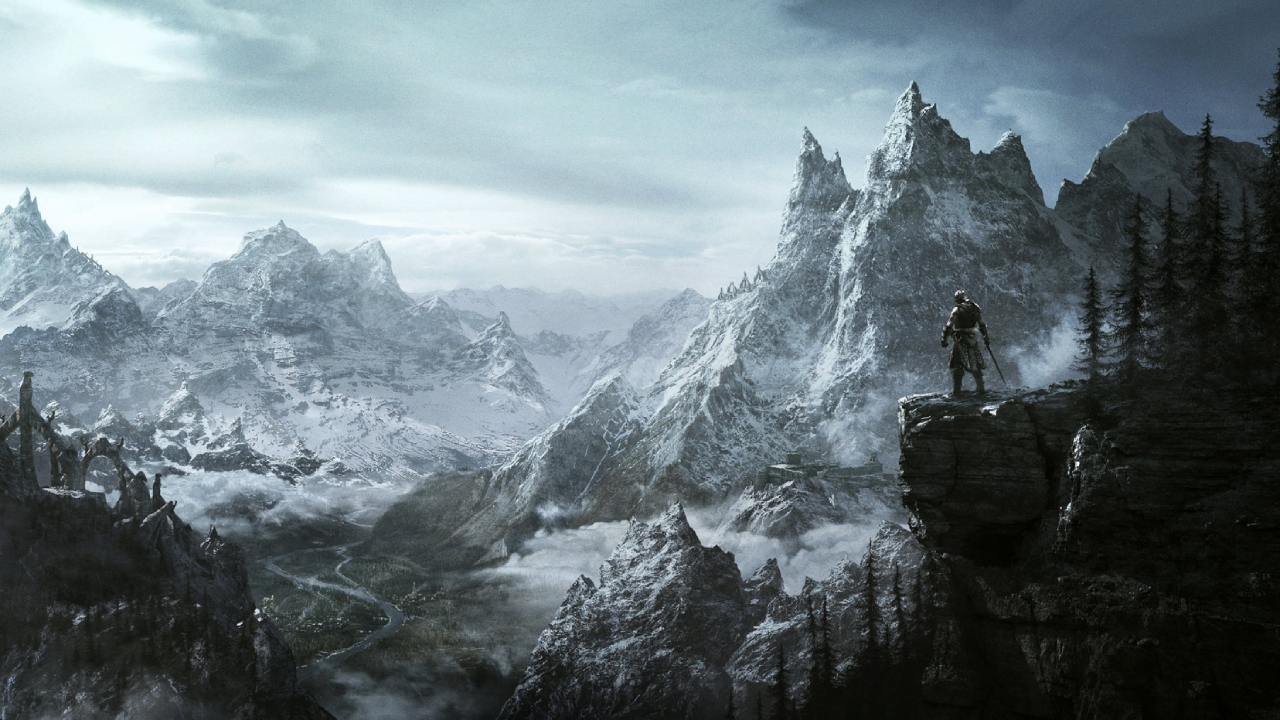
i find that this is a very interesting and perhaps somewhat contradictory stance for Bethesda to make as auteurs, because of how they pride themselves on the scale and immersion of their world. they didn't make Skyrim that way for players to not spend hundreds of hours in it. in that sense, my takeaway from the Hunter is essentially a judgement of the player who doesn't have the self-awareness to realize when the well has run dry. the type of person who plays a new Bethesda game for maybe even thousands of hours, yet feels cheated, empty, even angry when they've seen it all. the type of person that all sorts of RPG fandoms would dub a 'murderhobo', who starts overlooking the story and disengages from the fiction in favor of causing sheer havoc just to see how far they can push the envelope of Bethesda's design.
this is all a very interesting angle for Bethesda to wind up taking, but i don't think i'll be able to really fully start unpacking it until we've reached the end of the line with this main quest. for now, the Emissary and Hunter call a truce, since you've reached a threshold where you're changing the usual order and might be able to act as a tiebreaker between them. they send you on your way for your final few Artifact hunts, two of which wind up being a little more tightly scripted than usual.
in my opinion, the less interesting of these two quests takes you to the planet Freya III, where a research facility's experimentation on one of the Artifacts has opened up a multiversal split, sending the player bouncing back and forth between their 'main' timeline and one in which the facility was destroyed in a freak accident. i've seen people calling this one the game's best quest, and i'll concede that it executes the concept decently enough, but... i gotta be real, all i could think about was the fact that Titanfall 2 did this exact Schrödinger's cat concept much more seamlessly seven years ago. maybe that's a bit reductive, given the interactivity of Starfield's story as an RPG instead of a more tightly scripted first-person shooter, but i think it speaks to the way that even a Bethesda quest with some novelty and innovation feels like something other games have been solving for a hot minute. there's a choice at the end that's supposed to feel big and meaningful where you decide which version of the facility lives or dies, and apparently there's a complex method to save both sides at once, but i was close to the end of the game and i was fed up with fighting robots and bugs, so congratulations to my 'prime' universe for making it out alive, i guess.
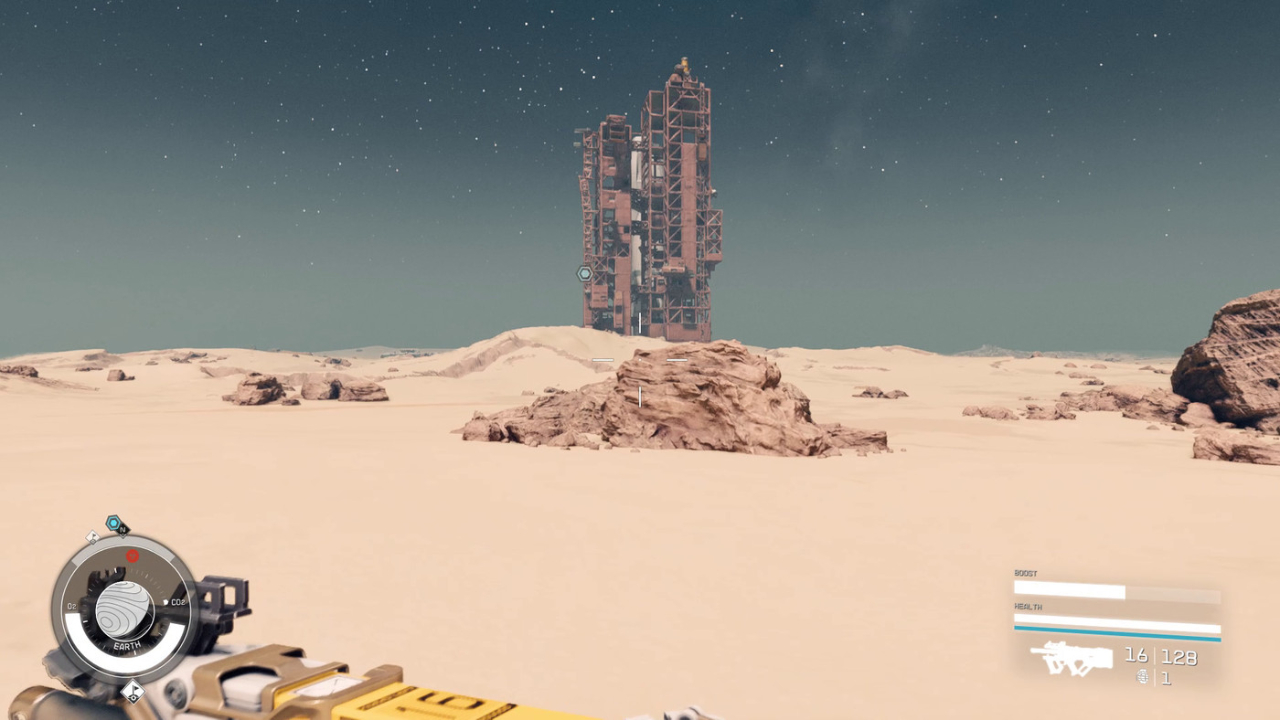
the other quest, given to you by the Emissary as a sort of cautionary tale for why nobody should be collecting the Artifacts (except for them, it's okay when they do it), isn't much more interesting from a mechanical standpoint. it does, however give us some more new facts and themes to chew on. your quest sends you after the first Artifact humanity stumbled upon, harvested from Mars in the early 2100s. it's still right where they left it, inside the abandoned ruins of NASA on Earth. it hasn't really come up a lot, because it all happened before living memory, but yeah, Earth has been stripped of its atmosphere and rendered uninhabitable. from a gameplay perspective, this gives Bethesda an easy out for not having to render our own entire world, although they couldn't resist having like, i dunno, the Empire State Building poking up out of a completely flat landscape so you know New York used to be here?
the big reveal here is that the desolation of Earth wasn't some kind of grand cosmic stroke of bad luck. the Artifacts, as always, grant visions to whoever touches them first, and in this case, it was NASA scientist Victor Aiza, who wound up meeting an alternate, presumably Starborn version of himself. this alternate Aiza taught his counterpart how to produce the first grav drive and jumpstart humanity's interstellar exploration, with the promise of human culture spreading and thriving across the galaxy, but he also warned him that the grav drive would inevitably bring about the end of Earth, offsetting its magnetosphere and stripping away its atmosphere. Aiza made the choice on behalf of all mankind and space travel as the world of Starfield now knows it was born. definitely a lot to unpack there, but we're closing in on the end of the story faster and faster, so let's put yet another pin in this one for a minute.
now that you have a better understanding of the truth behind the Artifacts and the dangers of their power and wisdom, the Emissary and Hunter confront you once again, asking you to pick a side before they head off to the Buried Temple, where their little 'game' always ends in one of them assembling the Armillary and making the next jump. i decided to tell them both off - it honestly seems like the only sensible option, given how terrible they both are? i agree with the Hunter when he calls the Emissary a hypocrite, but i'm also like, a human being who doesn't think his numb detached worldview is something worth striving for and empowering either. the two playfully realize they have an interesting opportunity to fight on the same side for once, and retreat to their Temple to await our final confrontation.
i know something like the Buried Temple sounds really cool, but honestly, it's just a pretty standard combat gauntlet, fighting through a mining facility full of various Starborn guardians until you reach the center, where the Hunter and Emissary have brought all of their collected Artifacts in preparation for a winner-takes-all battle. much like certain other RPGs that i've already brought up a million times in this piece, though, there's another way out, in the form of a persuasion check.
persuasion in this game works differently than in Fallout: New Vegas, and to some extent, even a little differently than in other mainline Bethesda titles. Bethesda's approach has generally been based on chance - when you raise your speech or charisma or persuasion or whatever the stat's called this time around, you're giving yourself better odds when using your words to win people over, whether that's talking information out of them or getting them to stand down from a fight. you can still ostensibly fail, no matter how hard you weigh those dice. New Vegas, on the other hand, treats all its various skills and stats as hard-locked numbers. a [Speech 65] check is a pass-fail system based on whether or not you put 65 points into Speech, so if you max that skill out, you will always talk your way out of any situation, up to and including Legate Lanius at the end of the game, who can be convinced that the Legion's war in the Mojave is a pointless endeavor that will inevitably spread their empire too thin.
in Starfield, persuasion is once again a matter of chance where you can only improve by weighing the dice harder and harder, but it's presented with a bit more gameification, which i have mixed feelings on. you can visibly see your verbal sparring opponent's 'meter', and you're given a few different choices of words, which will fill that meter up different amounts. easy small talk might only give you a few points, but big claims or major bluffs with a higher chance of failure might fill the whole meter in one go. you only have three 'turns' to convince your opponent, so there's a bit of push-and-pull about how you approach the situation.
why give you a crash course in these mechanics at the very tail-end of the game's story? well, because there's one more funny quirk of the persuasion system - get good enough and you can roll critical successes, which allow even the easiest, softest option to immediately fill the entire meter. and guess who decided to show up.
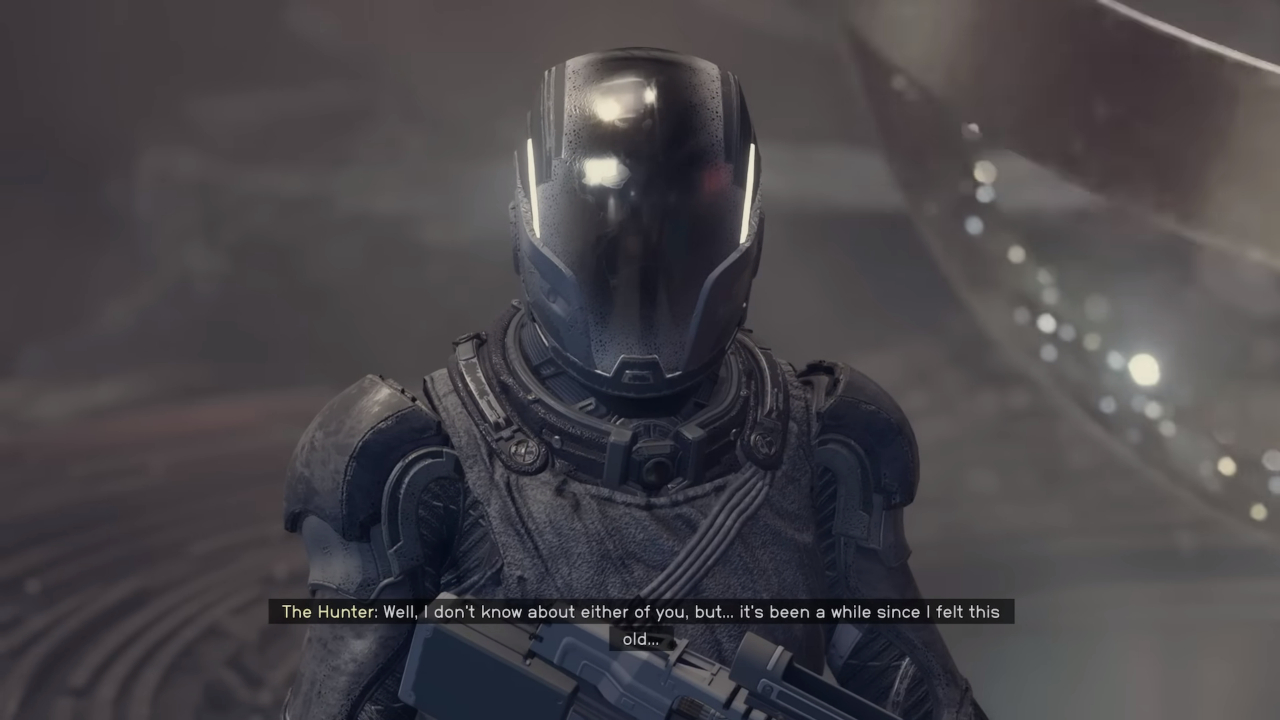
the Hunter is just barely willing to hear me out before we all start shooting each other over the Artifacts, but the Emissary wants to hear what i have to say, just for the sake of it. i look at them both and decide to start off with the light option of 'There are plenty of universes to fight in. Let this one see some peace'. it takes a minute to actually dawn on me that i just rolled a critical persuasion success. the Hunter is instantly snapped out of his nihilistic rut, for just a moment, to note that he hasn't really felt as ancient as he actually is in a long time. the antagonists of the game decide that just this once, maybe their cosmic game of cat-and-mouse can wait until the next go around. they hand me about a dozen Artifacts and vanish.
it's weird and toothless and feels entirely predicated on sheer luck, but it also feels like the most fitting possible ending to Starfield. the Starborn are so detached from the world, so numb to their own driving motivation, that their ideology topples like a house of cards at the slightest disturbance. i didn't beat the bad guys so much as i convinced them it's just not worth it to do this right here and right now.
there's still one last home-stretch to go, though, as Constellation has to decide what to do now that their quest is over. you have the full Armillary at your disposal and you're one grav jump away from entering the multiverse. the game encourages you to talk to each of your companions, who express equal parts excitement and anxiety. you all finally know at least a bit of the truth behind the galaxy's greatest mystery, and it opens a gateway to infinite adventure, the promise of always having more to discover. at the same time, though, you've all seen firsthand what becoming Starborn does to people, and there's no guarantee that it won't happen to all of you, or that you'll be able to remain together when you cross that threshold.
Starfield ends... sort of... when you cross into the Unity. you're greeted by yourself, or, as they cryptically put it, some version of yourself, whether that's from another world or just a form the Unity feels comfortable using to speak to you. charmingly, the game lets Captain Tallahassee say that this guy sounds nothing like them. apparently, everyone says that, and it's a moot point anyways, because of the nature of the multiverse. you sit and have a nice long talk with god-you, who dodges questions about the nature of the Artifacts and who made them and instead reveals to you the final step of becoming Starborn. in their own exceedingly poetic words -
PLAYER CHARACTER, OPTION 3: This is all too much. I don't understand.
'PLAYER CHARACTER': An example might help. If your colleagues in Constellation also choose to be reborn, for instance, then their spirit of discovery will spread across this universe. More people will start looking up at the night sky and wonder "what's out there?".
this last little wrinkle to the whole 'becoming Starborn' process is an interesting touch that raises some questions about how much your opponents throughout the game have intangibly tainted human nature, but the game doesn't dwell on this too much, as you're left with your final decision. you can enter the Unity, be reborn, infinite cosmic power, fingerprint on the fabric of reality, all that jazz. or, you can choose to walk away, to live a contented life in your home universe with the friends you've made, the material wealth you've acquired. obviously this question is posed in-universe as an important capstone to Starfield's story, but it also acts as a gameplay function too, and in either case, you can always reactive the Armillary once you've had your fill of life in this universe, so there's not much downside to stepping away. if you choose to do so, you have a heartfelt conversation with all your companions, who all similarly decided they couldn't go through with leaving, and then... the game continues. go do side quests as you please, or follow up on the associated Temples for the Artifacts your enemies handed over to you.
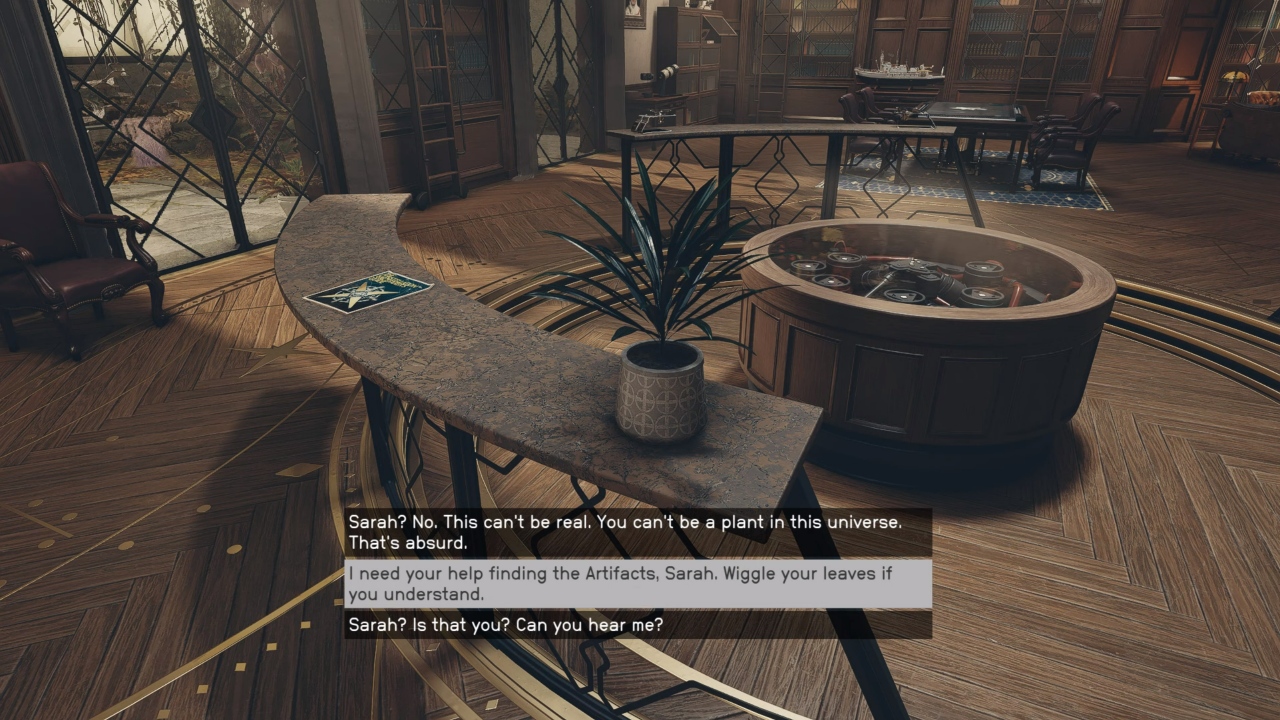
from a gameplay perspective, stepping through the Unity serves as an interesting spin on the idea of a 'new game plus'. it genuinely seems like one of the most unique things Starfield has going for it, to the point where early impressions became overrun by debates about whether or not players should rush through their initial playthroughs to get to it. having played nothing but Starfield for over a week, i decided to hold off so i don't burn myself out. my second-hand understanding is that crossing into a new universe grants you some Starborn-themed items that will upgrade with your first few successive playthroughs, and more importantly, it allows you to begin changing the story of the game. this seems to manifest in three main ways. you can skip the main story entirely by revealing your Starborn status when you first meet Constellation, shortening the game down and allowing you to recollect the Artifacts in a handful of hours to strengthen your space magic and enter the Unity again. you could instead choose to go through the motions once more, using your foresight of how events will play out to do things like preventing the death of your companions. or, you might find yourself in a variant universe, where something has gone amiss that locks you out of the story, whether it's friends turning into enemies or running into other alternate versions of yourself who've already started messing with the 'natural' course of history.
so, in a sense, that's how Starfield ends. either you continue jumping through iterations of the world, or you find one that you're willing to settle down in. it's an interesting approach, and i think it helps tie together a lot of what i want to say about this game.
let's gather up some of those pins we've been setting up throughout this whole thing. the world Starfield tries to build, and the way its mechanics often clash and make themselves very apparent in a way that puts distance between the player and the universe. the idea of a multiverse, and how infinite possibility can change a person, sometimes so fundamentally that you don't recognize them. the recurring theme of antagonists who's sense of awe and discovery have been twisted, turned from a noble pursuit for knowledge into a hollow attempt for arbitrary power.
i'll just start my closing arguments as bluntly as possible - Starfield is a game about exploring and understanding our universe that ends up at a conclusion where that innate human curiosity will inevitably go wrong. it is a game that, by nature of its design, ends up creating the exact kind of cynical detached player who it seems like it's trying to examine and critique. the only winning move is not to play.
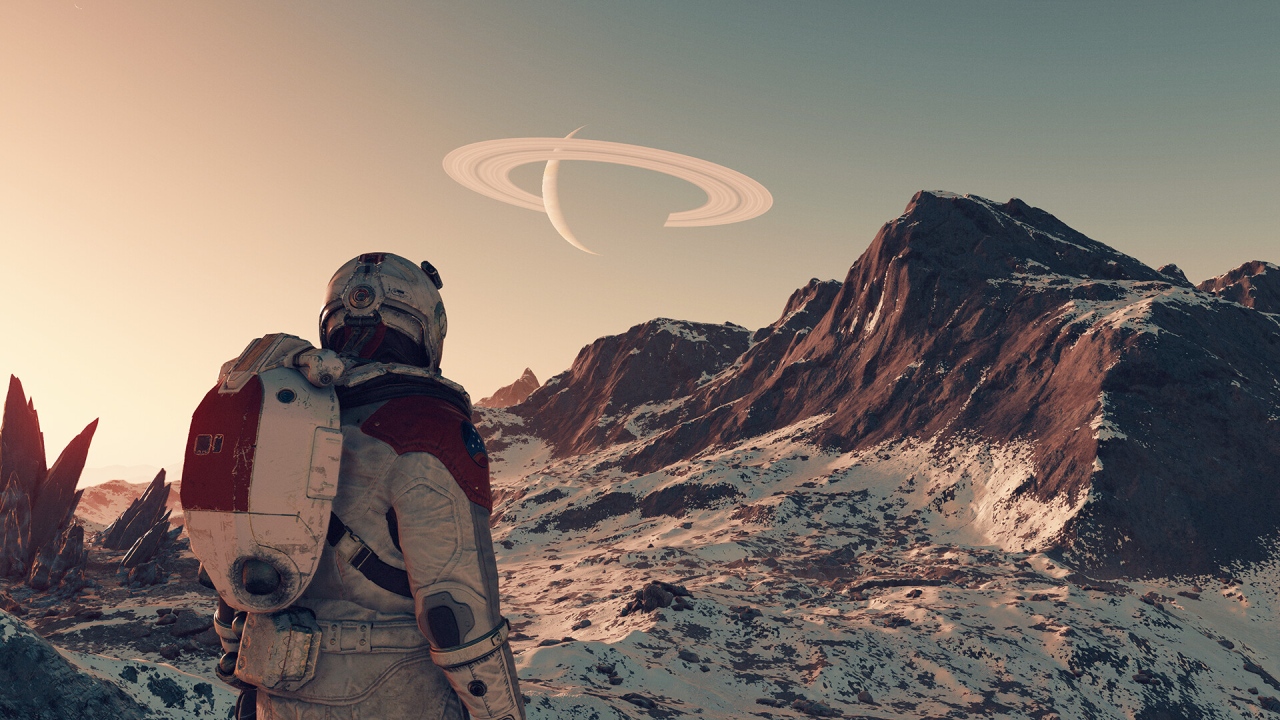
Starfield posits itself as a game about exploration and discovery. one of the harsher internal critiques it feels comfortable doling out to its subtly cyberpunk-y governments is simply that they've made space boring, that they've taken the wonder of the stars for granted and that Constellation is fundamentally a noble endeavor for keeping the spark of curiosity alive in this world. the issue, then, lies in how the game portrays that curiosity, in both its mechanics and its writing.
mechanically, as i've touched on a few times, exploring space is boring. i don't begrudge the game designers at Bethesda for maintaining an accurate scale of how vast space is, and discouraging or preventing players from doing interplanetary long hauls, but you explore in Starfield by clicking through menus and fast travelling, and 90% of the destinations were just thrown together by a machine. the impression i developed, which has been largely shared by a lot of people who've played this game, is that Starfield actually has the weakest exploration of any of the big three Bethesda franchises so far, because of how sectioned off everything feels. Todd Howard made big promises about 1000 planets, and sure, they're there, but people seem to agree they're pretty much not worth going to. maybe you'll dabble in it a little bit, but before the halfway point of my first playthrough, i felt like i was already done bothering with anything procedurally generated, to the point where i had to kind of begrudingly force myself to engage with that so i could have a fuller picture of how robust the algorithm really was. how robust is it? not enough to sell the fantasy of exploring the cosmos with wide-eyed wonder and reverence.
okay, well, what about other forms of less literal exploration, like investing yourself in the world and story, maybe making different choices? as i've been over, you can try, but there's certain parts of the Bethesda design ethos that they refuse to let go of that make it hard to do that, too. you could jump into a new universe and tell yourself that this is going to be the playthrough where you do different faction quests, take different choices, but the way Bethesda designs their games means that there's nothing stopping you from doing it all in one universe, either, and it means that no matter what choices you make, you aren't going to find yourself shaping a fundamentally different world. i could go through the Unity and decide i'm going to go with my gut and side with the Crimson Fleet this time, but the majority of the quests will go the same way, all my companions would still hate me for the same reasons, i'd have the same lack of meaningful defense against their judgment, and there'd be the same lack of consequences that ripple out through the rest of the world.
when seemingly big important decisions all exist in their own isolated corners of the world to make sure that the players can't lock themselves out of anything, it becomes hard to create meaningful differences between iterations of the world. even in a game with a multiverse full of possibilites, with a main quest that doesn't really require any faction investment, Bethesda somehow cannot find it within themselves to put their foot down and ask that, hey, if you want to side with the pirates, you're going to have to commit and save the cop shit for your next playthrough. nothing matters and you can be everything at once without having to enter the Unity, so is it really worth the trouble of starting over?
indeed, it's the one big permanent consequence in Starfield that you can change that actually makes me want to consider doing a second playthrough sometime. being able to save Barrett is a meaningful change! it's something permanent that i can do differently and it'll impact that playthrough accordingly! if you want the end of your game to open it up as something with infinite replay value, having meaningful consequences i can change or avoid gives me reasons to want to run it back.
as it stands, outside of that major divergence point in the main quest, i'd have two options for a repeat playthrough. it could either be a literal repeat, where i make all the same choices again, maybe with slight differences but ultimately funneling into the same major beats, or i can arbitrarily decide this one will be The Universe Where Tallahassee's A Cop, even though any given universe won't stop me from doing that, no matter how anti-cop i get. Tallahassee isn't a Freestar sherriff, or a Ryujin Industries operative, and those are decisions i made based on who i think the character is and what i would do in their shoes. not only would choosing those paths in another life be betraying that idea of who they are and any commitment to playing a role in this RPG, but i wouldn't even have to start hopping into the multiverse to do it if i really just wanted to keep thoughtlessly consuming content. Bethesda is dabbling in the idea of playing different contradictory lives across different universes, but the core issue here is that you can already live different contradictory lives in any one universe, because their games are afraid of cutting people off from potential content and rely on the player's disengagement if they want to create a consistent character who's invested in the world.
okay, so, how about we use that to walk this into some discussion of Starfield's thematic elements over its mechanical ones? do the storytelling choices embody that spirit of exploration? well, kind of, but it also feels like it undermines itself constantly, and i can't tell what parts of that are intentional or not. exploration and curiosity about the mysteries of the cosmos are good, noble traits, and it's bad that people have lost that feeling in this world, but everyone in this story who's followed those feelings has ended up in a waking nightmare. Victor Aiza pursued knowledge for the sake of knowledge and it damned the entire Earth, forcing a mass evacuation to the stars that seems to have laid the seeds for some massive unsolved generational trauma fueling debates between centrists and libertarians even centuries after the fact. deciding who owns what out there and why is messy and complicated and people have fought wars over it, so they've largely stopped bothering, outside of novelty services for people looking to go make a campsite on some barren moon or whatever.
the members of Constellation have devoted their lives to solving the mystery of the Artifacts, just for the sake of knowledge, and what awaits them at the end of the journey? well, more journey, and on paper, that makes sense. that's not an uncommon ending to this type of story - it's not the destination, it's the journey, and to know that there's always more possibility out there is a wide-eyed optimistic ending. the issue here is that there really is no joy in this ending, or at least, whatever joy can be found is conveyed in a very abstract sense.
sure, if Constellation choose to be reborn, they get infinite adventures and their spark of curiosity will restore a sense of wonder throughout the fabric of reality, but we've seen multiple examples of what this does to people, and it's literally never good. at best, you become desensitized to the world, disconnected from your sense of wonder, obsessed with going through the motions over and over and over ad infinitum just to say that you've 'won' and gotten stronger. at worst, you reach that point and start spinning it into a philosophy that nothing matters, that you can inflict as much suffering as you want, that experiencing the world and partaking in that initial sense of curiosity that got you here is just an nonoptimal way of getting to your endgame. the writings you find from the pilgrim are an internal debate about the efficency of interacting with lesser beings who don't understand the whole Starborn thing, and about whether or not it's okay to be satisfied and finally stop 'playing the game', which is... pretty much the situation the player is going to find themselves in.
really, it's a little impossible to shake the Undertale vibes here. that, too, is a game with heavy meta-textual layers about choice in video games and the way players engage with the medium. its best ending comes from you choosing to invest and engage and care about character's lives, to help them cope with their trauma and break cycles of suffering. the game itself asks that you don't approach it like a completionist - it tells you these characters finally have a happy ending and asks that you grant them that peace and closure by ending your participation, and it has ways of twisting the knife and punishing you if you ignore that warning and decide to fuck around and find out.
Starfield approaches that precipice, but it never quite commits. maybe it's just me and my specific perspective, but all my takeaways as i kept digging deeper into this mystery is that this is a story about how to continue playing is to inevitably become the villain. you, too, could be the Hunter, if you start viewing this world like a game, and you will view it like a game if you keep playing too long.
i think in some sense, this even connects to my issues with the game's general moral compass. based on what it presents as antagonists, it's clear that the ideal protagonist Bethesda pictures for the world of Starfield is someone who's curious about the world, but also someone who cares. someone who invests themselves wholly and lives in this world. someone who listens to the plight of every NPC, whether they're found in a major subplot or a procedurally generated wasteland. to be the villain is to disconnect and disassociate, so to be the hero is to enrich your connection.
the dissonance comes from the narrow-minded view of 'caring' that Bethesda's writers seem to consistently fall into. good guys care, so they support one of the big nations like the United Colonies or the Freestar Collective. sure, they have problems, but they give people cushy office jobs and paychecks and homes, and that's caring. they fight pirates, and pirates are people who don't care, because if you steal or kill or go outside the law, you don't care about other people. it doesn't matter if the law itself was unjust, because clearly the people who makes laws always make good laws for good reasons, and maybe people get screwed over by those laws, but the government definitely cares, and you should too, so you and the government should be on the same side about this stuff. right? i mean, that's why the god-you in the Unity congratulates you on helping the Space CIA. you made space safer. don't think too hard about it. you get a gold star for being definitively morally correct.
i fully understand that i have leftist views about issues like the prison system and capital and government. i get that my politics are not some default, universal experience, and i'm not asking that Bethesda write their games to only accommodate me. i'm not trying to sit here and tell you the Crimson Fleet did nothing wrong, and i mean that in a multitude of ways - of course they did something wrong, they're pirates, they kill innocent people, they suck. and also, they're fake! it's fiction! it's a game! they don't have nuanced internal lives that inform their politics because they're fake people in a video game! i can't sit down and debate with Delgado about complex intersectional issues because he was written to just want that damn treasure!
one last time, though, i think we should look to Fallout: New Vegas as a model for what Bethesda could be doing better. the NCR exists in a similar space to the United Colonies. they are, from the perspective of your average joe schmoe centrist American player, the good guys. they seek to uphold the ideals of freedom and democracy from pre-war America. they're here to fight the really bad guys, like Caesar's Legion, although they might sometimes wind up at odds with the wrong people along the way, like their tensions with the people of Freeside who they don't see eye-to-eye with. one of their biggest sins is stretching themselves too thin, trying to handle the needs of a burgeoning nation out west while devoting resources to the Mojave conflict, often overextending in the hopes of staking their claim on these lands when the battle is won. even their own citizens aren't always sure what to make of them sometimes.
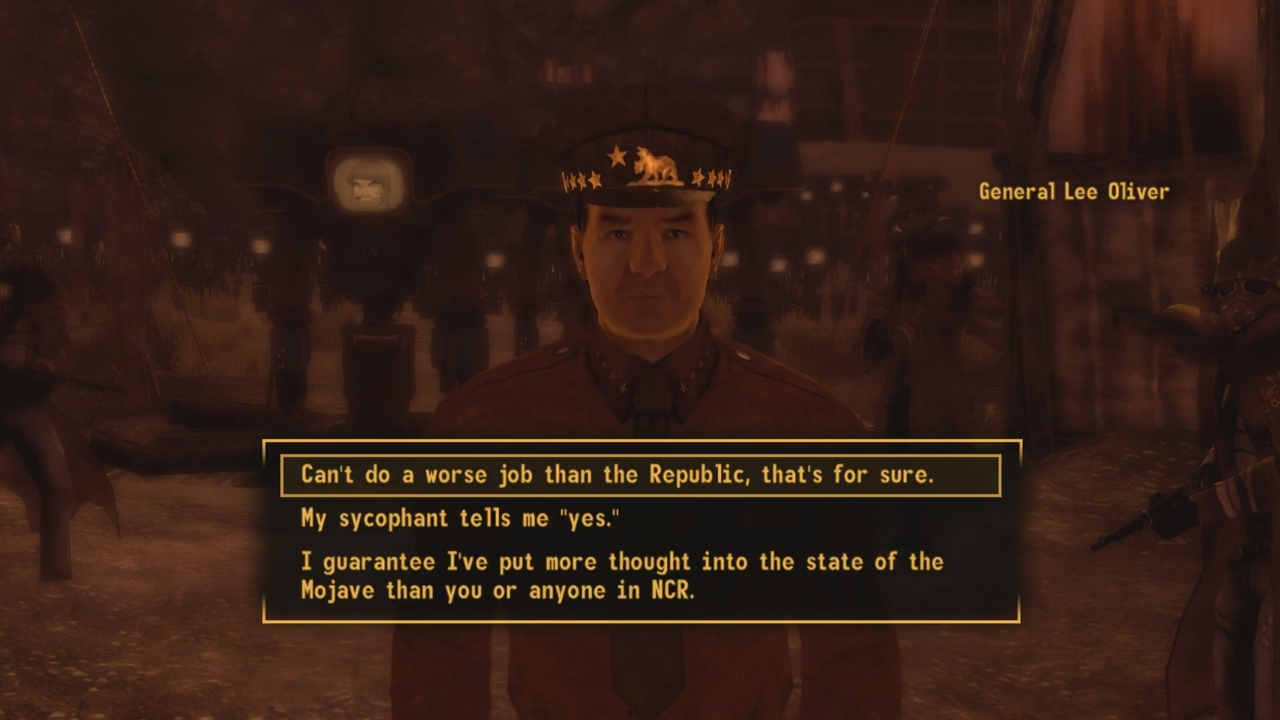
once again, New Vegas benefits from tighter, smaller storytelling and the mechanical ability to handle a mixed reputation. early on, it was easy to justify doing favors for the NCR, especially in contrast to seeing what the Legion had been up to. as i kept playing, though, i developed a deeper understanding of their flaws, saw key examples where they tried to grip the Mojave too tightly. when i chose to pursue an independent Vegas, it was mostly for the sake of the people who'd been screwed over by these powerful nations for too long, yes, but i also saw it as something of an act of sympathy to the NCR. they don't need to be extinguished or destroyed, but they need a potent lesson in anti-imperialism. it's for the best that they turn back home with their tail between their legs and have a little time-out to think about what they messed up, while the Mojave takes its first unsteady steps into becoming an independent coaliation of its own. i detest General Oliver and i relished in the opportunity to tell him to fuck off, but i also think i was kind of telling him what he and the entire Republic needed to hear, too. it's what's best for everyone.
that's how you create exciting interactive fiction that makes me care about the world. New Vegas doesn't just paint a deeper world, it also gives me multiple meaningful paths to take my interpretation and act upon it. in Starfield, the only way to show opposition to the United Colonies in any way that actually matters is by becoming a sociopathic bandit, and even then, the game won't stop me from turning around and signing up for the Vanguard. the only punishment it's really able to give me is that everyone will hate my guts for it, because all four companions, despite coming from a wide range of backgrounds, honestly love and hate pretty much all the exact same things. i recognize that the game wants me to care about these people, that caring about these people is basically the entire fulcrum of this game's moral axis, so i end up actively taking the road i despise because i'm trying to meet the game at its level. Starfield wants me to care, but it wants me to care about the things it has already determined are good to care about, at the expense of what i actually care about, with no room for nuanced opinions or interesting solutions.
obviously, New Vegas is a piece of fiction with writers - it only has so many options and it just so happens to have ones that appeal to me. not every game ever made owes me that. over the course of my playthrough, though, i really did develop a sense of attachment to the world and a bit of conviction and pride in the choices i made. things might be messy and not everyone was going to like the way i did things, but the choices felt like my own and the game gave me all the room i needed to puzzle out how i wanted to solve big-picture issues. Starfield, on the other hand, feels like it's just throwing its hands up in the air and saying that everyone sucks equally, except for the fact that the fiction not-so-subtly holds the firm viewpoint that being a CIA narc is fundamentally better than being a pirate. when faced with tough choices, the game strongly implies the only moral option is to suck it up and go with the deeply flawed status quo. pirates killing people is bad, but the state deciding who deserves to live and die is okay, and if you disagree, it must just be because this is your 'evil playthrough' of Starfield, right?
i think it's also worth pointing out how these two games handle their less serious elements, too. i know i've talked New Vegas up as this intense sociopolitical drama, and it is, but it's also a deeply silly game - you saw the guy from Friends on that cross up there! when all's said and done, it's still the one where you get the King's cyborg dog a new brain from that ski lodge full of mutants. the writers knew how to make that silliness feel very human, though, and weave it into their storytelling to enrich it. the Kings are a roving gang of Elvis impersonators based on faulty information passed down from the old world, but they've also spun his music and mannerisms into their own weirdly uplifting ideology. arguably the most succinct metaphor for the NCR's imperialism is the one where Cass evokes the legendary Long Dick Johnson. the people of the Mojave really feel like people in large part because of the places where their lives contain a very human tendency towards levity.
Starfield doesn't shy away from getting a little silly, but i find its tone to be a lot more scattershot and less deeply integrated. the recurring Chunks stores that sell pre-cubed space food seem to gravitate towards a bit of satire that ties in with the dystopian undertones of this game's world, but there's also side quests about stuff like becoming space Batman or finding a Clone High-esque planet full of historical figures debating over how to run their isolated little society. these elements are all pretty good on their own, and i welcome them (and the opportunity to have Amelia Earhart hanging out as part of my ship's crew), but they sometimes feel dropped into the primordial soup of Starfield lore at random. they don't really weave into my understanding of this world, they just expose how much it relies on existing tropes, whether they be sci-fi genre staples or recurring elements from Bethesda's history.
you know what, just because this is probably the last time i'm going to bring up New Vegas, let me rapid-fire through some critiques of the game so that you know i'm not trying to say it's some kind of perfect flawless piece of art with nothing left to improve upon.
having a short and rushed development time honestly helped Obsidian dodge a lot of bullets, because they've gone on record as saying that a lot of unimplemented content had to do with fleshing out the Legion and giving players more potential reasons to see their side, which, as i went over earlier, would actually be pretty damaging to what i like about the game's storytelling.
that same rushed development obviously led to a pretty buggy final product and i have to imagine working conditions weren't exactly great. bad situation for players and more than likely for the developers too.
some of the companions feel like they were given way less attention than others and their side quests can often be overly esoteric, to the point where i just never got any closure on Lily because i guess i didn't hover close enough while she talked about her medicine.
just like in most mainline Bethesda games, anything to do with crafting stuff feels half-baked and not worth engaging with. it hadn't quite reached modern levels of bloat where you have whole periodic tables and multiple tiers of specialized research, but that mostly just means there's not a lot worth spending the time and resources to make.
having the DLC installed at all, which pretty much just came by default by the time i played it, raises the level cap all at once and hurts the overall balancing of the game. i went in making a charisma-heavy character, and by the end of the game i was also super good at all kinds of science shit and supernaturally lucky at blackjack, just because i had more points than i knew what to do with.
Honest Hearts is a really interesting parable about the nature of revenge and religion, but you can really tell they were trying to get out ahead of the 'white savior' vibes the whole thing has, and i feel like there's a lot more they could have done to handle that better, up to and including just going back to the drawing board entirely and finding a different angle into exploring Joshua Graham's whole deal.
Lonesome Road has some cool ideas going on, but is largely tedious to actually play and suffers heavily from janky restrictive scripting that wasn't built to accommodate the main game's mixed reputation system, meaning that i spent basically the whole time with Ulysses lambasting me about pro-NCR opinions my character didn't actually hold.
see, it's not perfect! it's just so astoundingly, astronomically better than anything Bethesda's made that i might as well be calling it perfect. there's totally a difference!
perhaps one of the biggest fundamental differences between New Vegas and Starfield is that New Vegas really, truly ends. when all's said and done at the battle of Hoover Dam, you receive one of the series's signature slideshow finales, going over the fates of various characters, settlements, and factions based on the actions you did or didn't take. maybe the presentation's a little sterile, sure, but it goes into pretty extensive detail, with many characters and sub-factions having close to a dozen potential endings. i still have the entire monologue from the end of my playthrough transcribed and saved, to look back on and admire the choices that game afforded me in shaping my own vision for the Mojave. if you load the same save back up, you're dropped into the moments before you commit to the final confrontation, free to wander and tie up loose ends, but most likely already on the path that had given you your particular ending.
in the nearly 13 years since Fallout: New Vegas's release, no canon Fallout material has gone anywhere near the west coast of America or made any declarative statements about what happens in that region beyond the year 2281. i really can't blame them for not trying. as much as i long for a game that follows up on the rich storytelling of New Vegas, i don't think i'd have it in me to be the person responsible for choosing which version of its vast flowchart of endings is the permanently enshrined truth of that fiction. it can be nice to imagine, though.
Starfield doesn't get that kind of closure. even now, i can only say that i kind of completed it. sure, they bothered to give you a unique conversation with your companions if you decide to turn away from the Unity for now, but one "aw shucks, you'll go through that portal one of these days, you sly dog" later and it's back to business as normal. the state of the world at large is, honestly, basically the exact way it was when i started the game, except now i have some cool magic and i know i could decide to go into the multiverse one day. if i were to do so, there wouldn't be any greater purpose that awaited me beyond dabbling in a handful of meaningful changes to the timeline and repeatedly strengthening my cosmic powers.
so, then, put together my mechanical and storytelling critiques, and what do you get? Starfield is a game about the wonders of space wherein the greatest mystery in the universe is to fly through some hoops 24 times, so you can then fly through 216 more hoops and become the exact type of careless metagaming asshole the game warned you against becoming.
it hasn't taken long for this level of depth to impress Redditors all across the globe. isn't it craaazy that you're actually just like the Hunter when you stop and think about it? i mean, not really, no. the Hunter might be the one who views this all as a game in terms of violence, but i'm the one who knows for a goddamn fact it's a game because i have to keep grappling with only being able to say the types of things an entire team of writers think i ought to be saying.
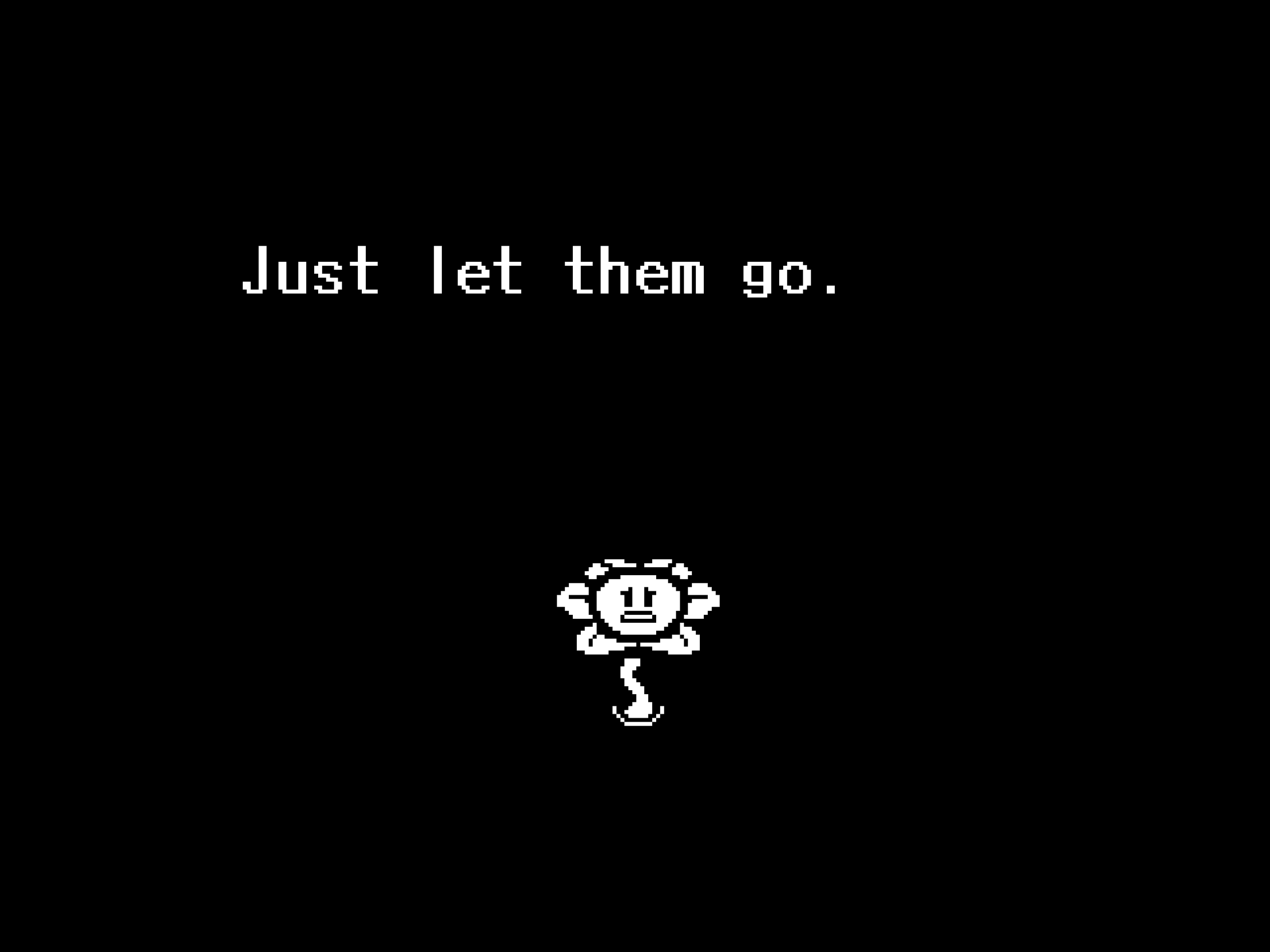
when i compare some of this game's themes to Undertale, make no mistake, i'm not saying it handles them anywhere near as well. for starters, Undertale and i are pretty much on the same wavelength about what it means to extend kindness and understanding to people, whereas Starfield dips its toes in yet recoils when the stakes run high and simply declares whole groups of people as less worthy of your compassion and mercy. Undertale absolutely follows through on its promise that it'd be bad to deny that world its closure - if you choose to dive back in, there's nothing rewarding about it, it feels like you're doing something deeply inhumane. Starfield doesn't spell it out as hard, but it certainly implies a similar idea... while also tempting players with cool Starborn suits and 10 levels of magic if they keep playing, to the point where a lot of people just immediately went straight to willfully overlooking this thematic crap and min-maxxing the fastest route back to the Unity with no self-reflection.
Undertale puts you through visceral struggle to become the bad guy, whether it's by grinding levels or by going all-out with the feeling of guilt that comes from mistreating characters you're supposed to like. perhaps the biggest failure of Starfield's story is that it's actually really easy to become the bad guy. in some ways, you already have to disengage and keep the world at arm's length just to try and keep yourself grounded in its reality. it's not uncommon advice across Bethesda titles to simply not play the main story if it doesn't line up with the type of character you want to play, which feels so monumentally backwards to me. like... the main story. the one that i have to interact with before i even start making a guy. the one that presumably has most of the unique characters and dialogue they worked hard on in this role-playing game. because it'd somehow be more immersive to ignore the life-changing magic rock i touched and go do procedurally generated cargo hauls if i have complaints about how the story's going. and that's on me. i guess.
there was actually something that happened to me in the midst of the game's finale that i think puts a really fine point on why it's hard to engage and invest, and how paper-thin all the facades are. i took Sarah in with me as i approached the Buried Temple - even though things had been tense with her, she is the head of Constellation. this is her mission just as much as it is Tallahassee's and, from a gameplay perspective, i figure she's going to have the most interesting things to say about what's going down here as a result. evidently, i cross some kind of 'companion points' threshold as we fight side-by-side against the Starborn, because the instant i talk the antagonists out of a fight, she's chiming in about how she wants to talk.
i don't have the exact dialogue in front of me right now, but it's very much out of line with the amazing miracle we just witnessed. it's a very standard part of her companion quest. her dialogue and my own options for responses talk about Barrett like he's still around, because this is clearly a conversation i would have had much earlier in the game if i had liked Sarah more and brought her on more quests. the game doesn't rearrange its queue of events or have checks in place to make sure this doesn't happen, and like so many aspects of Starfield's storytelling, the expectation is put on my shoulders to paper over it myself and treat it like a game. you know, like the bad guys do.
this wasn't even the first time it had happened. another conversation with Sarah had her opening up about her relationship with Aja, the previous head of Constellation and her mentor. i had met Aja already - she attended Barrett's funeral and we had a solemn little talk - but to progress the conversation at all, i had to act like i didn't know who she was talking about. Sarah off-handedly mentioned that she'd love to visit Aja in the Porrima system, which i recognized as meaning Paradiso, so i brought Sarah along next time a fetch quest happened to send me over that way. i found Aja hanging out at the resort and brought Sarah in. they didn't acknowledge each other. no unique dialogue for this situation. maybe there's a scripted moment that's supposed to happen later if i keep working on my friendship with Sarah, but... the game handed me a bunch of information and when i put the pieces together and engaged with the fiction by acting on it myself, it didn't even have the tools to acknowledge what i was doing.
Starfield posits that to view the world as a game is to lose touch with your humanity and goodness, that it is the ultimate corruption of the innate human desire to explore and discover. that's a really interesting angle for a Bethesda game to be taking. unfortunately, it's an angle that's being taken in a Bethesda game. not only does the in-universe fiction do nothing to imply that anyone can avoid this terrible fate, but the game as a piece of interactive media constantly reinforces this way of thinking, whether it's Sarah telling me she can't kick me out for any reason or ignoring an old friend when i try to listen to what she's saying and do my own follow-through. it all ends up feeling like it was built from the outside-in, like every bit of metatextual commentary exists because Bethesda played their own game and realized how shallow it was, rather than trying to tell a story and build methods of interaction that strengthen those themes.
i might find that Starfield's tone and message end up feeling deeply confused and fail to resonate with me, but it's definitely an interesting type of failure. like i went over earlier, i don't think there's any world in which tackling the biggest mysteries of the cosmos doesn't bring something out of you whether you like it or not, and this is absolutely the title that comes the closest to reflecting on the type of game Bethesda makes and how people engage with it. it posits a lot of interesting questions about what drives us to know more about the universe and how wanderlust can become dangerous when you start losing sight of the world around you. unfortunately, both the storytelling foundation it was built upon and, in a broader sense, the fundamental mechanical trappings of a Bethesda game, weren't built to withstand this level of high-octane sci-fi existential crisis. i don't think there's a way that the same studio who devoted themselves to procedurally generating the galaxy could ever truly manage to reel it back in and commit to an ending that speaks to the more intangible, ethereal excitement of learning about the world.
in some deep, primordial sense, i almost think Starfield is a game about Todd Howard begging modern gamers to still be impressed that they can go climb those mountains. it's not a perfect analogy, but... it's a game that paints exploration as some kind of pure, uncorruptible platonic ideal and desperately tries to make you take it at face value while constantly building up how hollow it all really is underneath the surface if you're just doing something for the sake of itself. if that's not the most metatextually Bethesda shit imaginable, i'd love to see what can top it.
i feel like no matter how i wrap this whole piece up, i'll have damned Starfield with faint praise. i can tell you that i didn't have a terrible time with it and that there's parts i enjoy, but i mean, look at how long this page is, clearly i had some gripes i wanted to get off my chest. i can assure you that if i really don't like a game at all, i'm not gonna keep trudging through it, so something deep down inside Starfield was compelling enough for me to keep trying to find the good in it. it's a game that really tries to be a dozen different things and is just about okay at half of those things. the combat stuff is all... pretty alright. i can almost see myself firing it up in the future as a good game to play while i'm really just trying to listen to podcasts, in that regard. should you go play it? i dunno, probably not unless you're already the type of person who tolerates Bethesda games. they certainly didn't do anything too different this time. if you're cool with that type of thing, then sure, you could do worse.
i don't know if i can really say i'm disappointed in Starfield, because i didn't have very high expectations for it in the first place. on the one hand, i think by coming so close to having interesting themes and then undermining them so thoroughly, it exceeded my expectations, because i would never have assumed i would have this much to think about with this game. on the other hand... yeah, i am disappointed. not every game has to be designed for my tastes, and i know plenty of people wholeheartedly love the way Bethesda makes their games. i just can't shake the feeling that they could do better, though.
one of the most striking things about Starfield really is that pervasive sense that it was designed in its own little bubble. there is almost nothing about this game that feels like it came out in 2023. part of that is just the nature of triple-A game development - as projects take longer and longer to come to fruition, you end up stuck in your direction early on and you don't know what the rest of the scene is going to look like by the time your game is actually finished. it feels almost unavoidable that this is going to happen to the hotly anticipated Elder Scrolls VI, a game that Bethesda felt the need to announce with nothing more than a logo back in 2018 that might not be released until 2028. if you want my two cents, i think Starfield's relatively strong financial success shows Bethesda that there's still an audience for sheer scale over depth, and i'm expecting Elder Scrolls to start dabbling in generative text models or some other bullshit to keep bloating the design even further. "remember when you all laughed because the guards wouldn't stop talking about an arrow to the knee? well, now ChatGPT will generate infinite new ambient dialogue. don't worry too much about the quality or consistency. what's important is quantity."
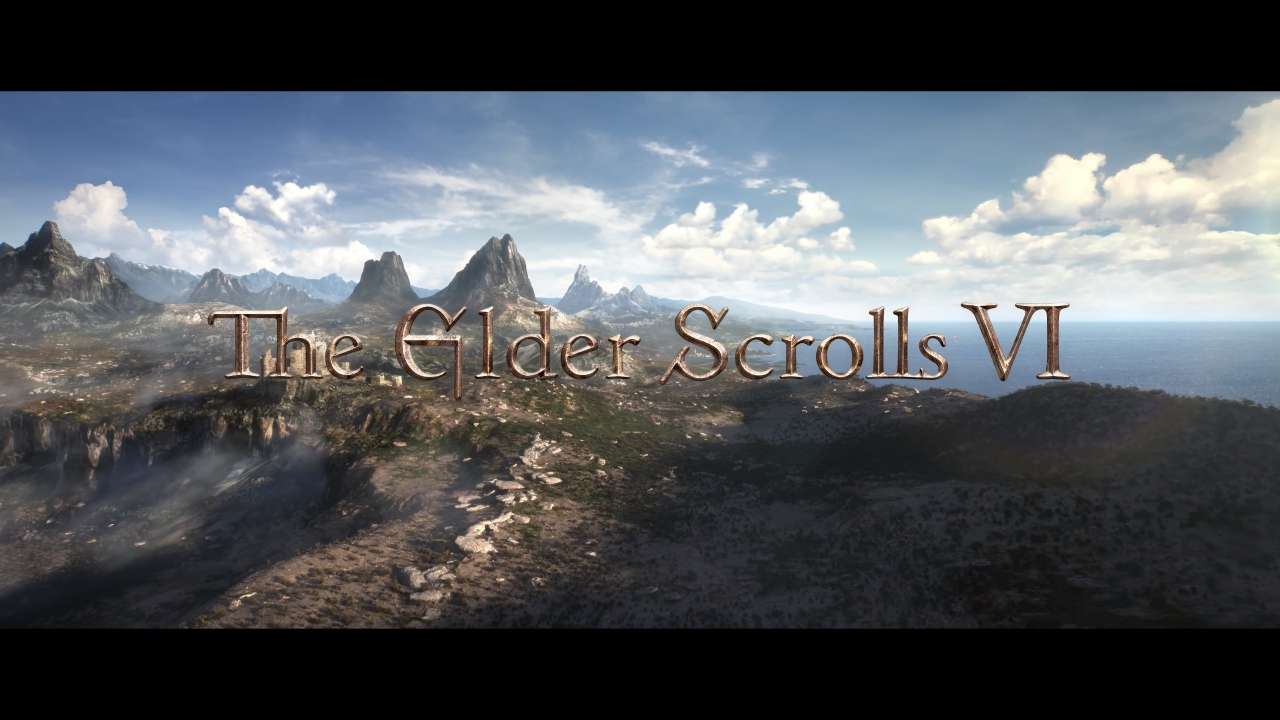
the disheartening thing is that even if it weren't for games from 2010 outdoing Bethesda by showing how you can combine open-world design with deep, enriching, meaningful interactive narratives, Starfield isn't all that impressive compared to its contemporaries, either. The Legend of Zelda: Tears of the Kingdom is another one of the biggest titles of the year, and while i kind of loathe that game's storytelling, at least it sacrifices narrative depth for something worthwhile - actual mechanical ambition with its absurd dedication to freeform physics-based puzzle solving. on the RPG side of things, i haven't had the chance to try Baldur's Gate 3 for myself, but i've heard nothing but praise for its writing and interactivity, and the ways it replicates the feeling of actual tabletop role-playing. Starfield is... none of these things. it's breadth for the sake of breadth without any of the mechanical or storytelling chops to make that breadth amount to much.
i mean, really, of all the big-budget triple-A games of 2023, i assure you, this is the last one i thought i'd end up writing about. it's Skyrim in space. how much could i have really found to say?


